 25/01/2010 19:35 25/01/2010 19:35 |
|
| | | OFFLINE | | Post: 19.345
Post: 1.986 | Registrato il: 28/08/2005
Registrato il: 20/01/2009 | Administratore | Utente Veteran | |
|


 VESPERS ON THE FEAST OF
VESPERS ON THE FEAST OF
THE CONVERSION OF ST. PAUL
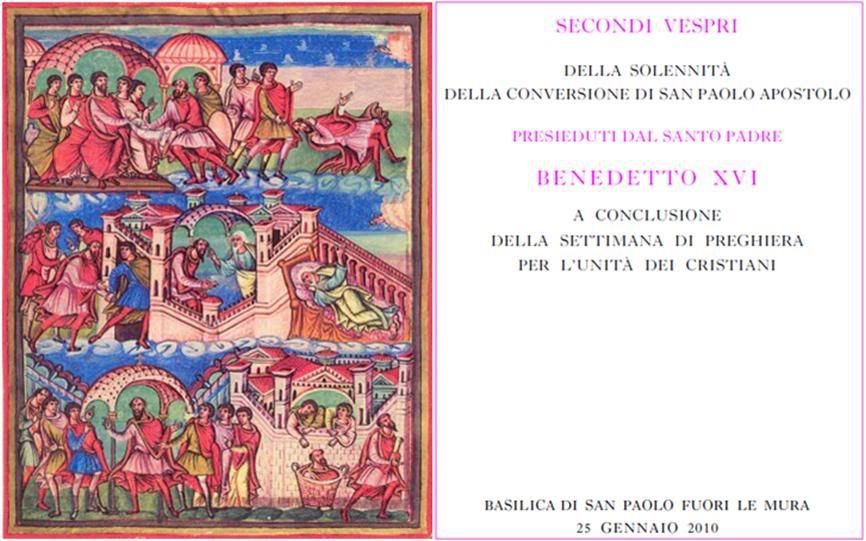 Libretto cover: From the Bible of St. Paul, IX cent., Abbey of St. Paul outside the Walls.
Libretto cover: From the Bible of St. Paul, IX cent., Abbey of St. Paul outside the Walls.
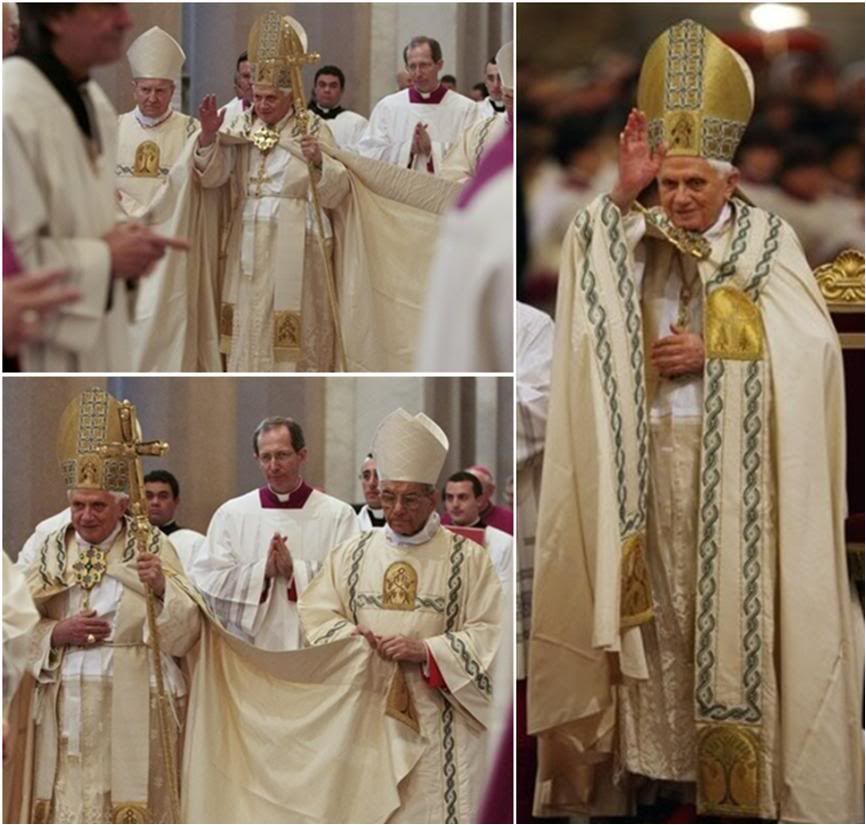
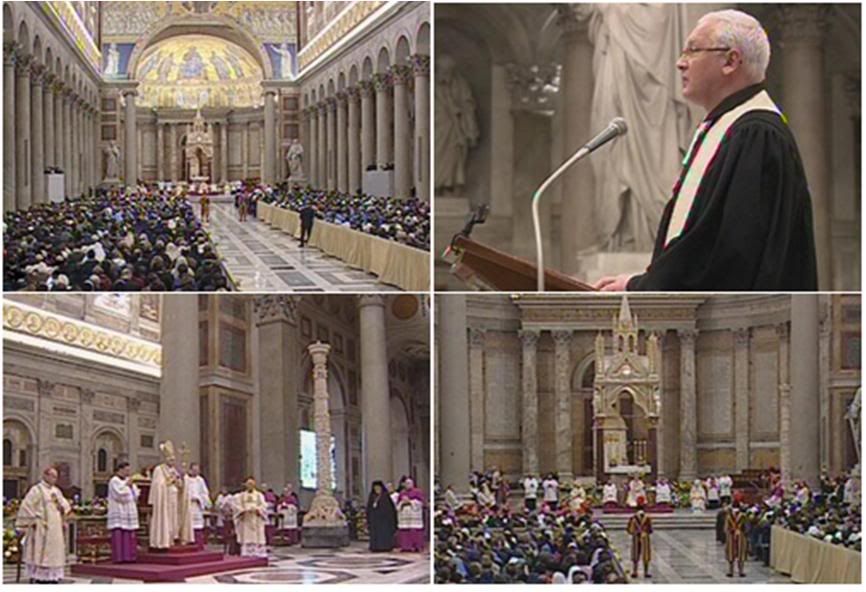 Pope ends Week of Prayer for Christian Unity
Pope ends Week of Prayer for Christian Unity
with renewed call for new evangelization

January 25, 2010
Pope Benedict XVI presided over Vespers this evening marking the Feast of the Conversion of St Paul in the ancient papal Basilica of St Paul’s Outside-the-walls.
The Holy Father left the Vatican at sundown, crossing the Tiber and travelling by motorcade beyond the ancient Roman walls to preside at the ceremony.
There he was joined by the Archbishop of Canterbury’s representative to Rome Rev. Dr. David Richardson, the Orthodox Ecumenical Patriarchate’s representative to Italy, Metropolitan Gennadios, as well as delegations from Rome’s other Christian communities.
Together they prayed above the tomb of the Apostle to the Gentiles marking the end of the Week of Prayer for Christian Unity.
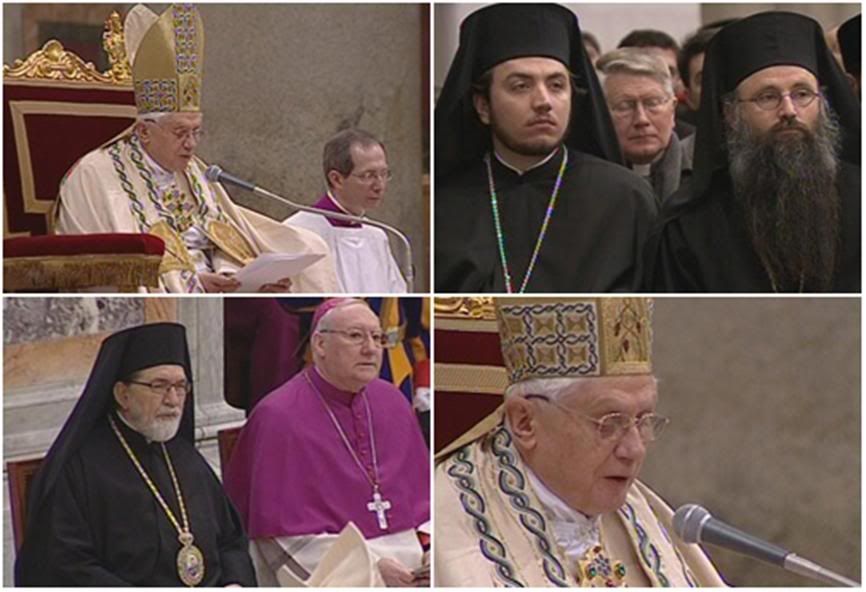
In his homily, Pope Benedict reiterated that “Unity is a gift of God and that it is the mission of all Christians to strive to be one".
He said "the force that promotes unity and mission flows from our fruitful and exciting encounter with the Risen Lord”, as happened to St. Paul on the road to Damascus.
The Pope also spoke of the one hundredth anniversary of the Missionary Conference of Edinburgh in Scotland, which is seen by many as a defining event for the birth of the modern ecumenical movement.
He said “a century later, the intuition of those brave pioneers is still relevant, in a world marked by religious indifference, and even by a growing aversion to the Christian faith”.
Pope Benedict said “Christians are called to offer a common witness to address the increasingly complex challenges of our time, like secularization and indifference, relativism, hedonism, the delicate ethical issues concerning the beginning and the end of life, the limits of science and technology, dialogue with other religious traditions”.
The Pope said also now Christians face the additional challenges of “the preservation of creation, the promotion of the common good and peace, defence of the centrality of the human person, commitment to overcome the miseries of our time, such hunger, poverty, illiteracy, the unequal distribution of goods”.
Pope Benedict said that differences between the Christian Churches remain but he added that “hopefully they can be overcome through prayer and dialogue”.
Looking forward to centenary celebrations of the Edinburgh Conference in June in Scotland, The Pope concluded by calling for “a new, intense work of evangelization, not only among people who have never known the Gospel, but also among people for whom Christianity is part of their history”.
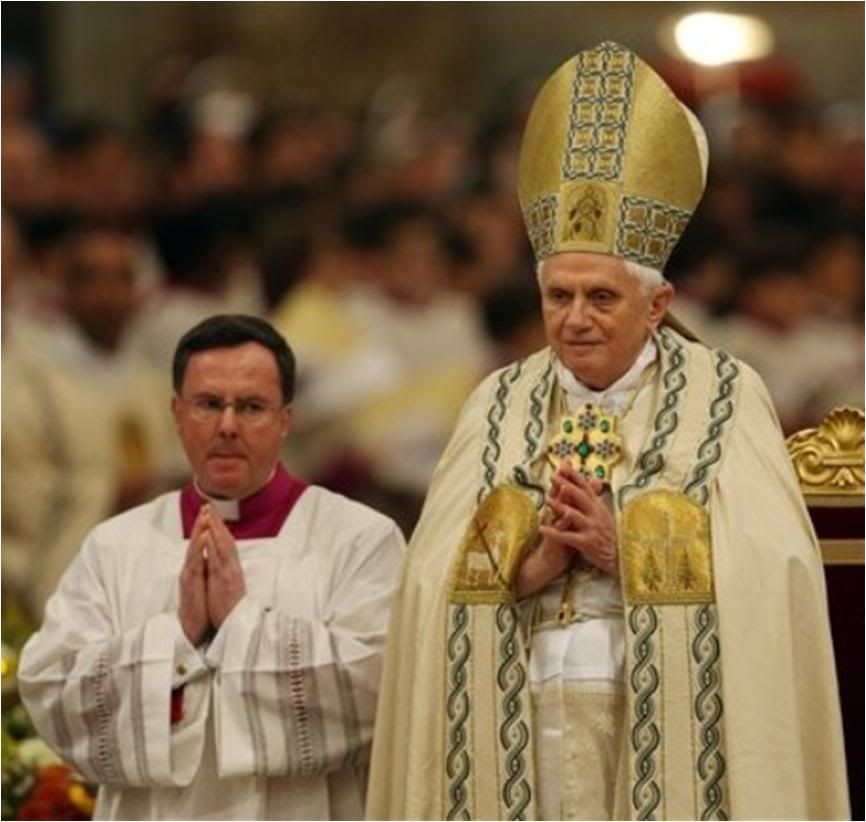
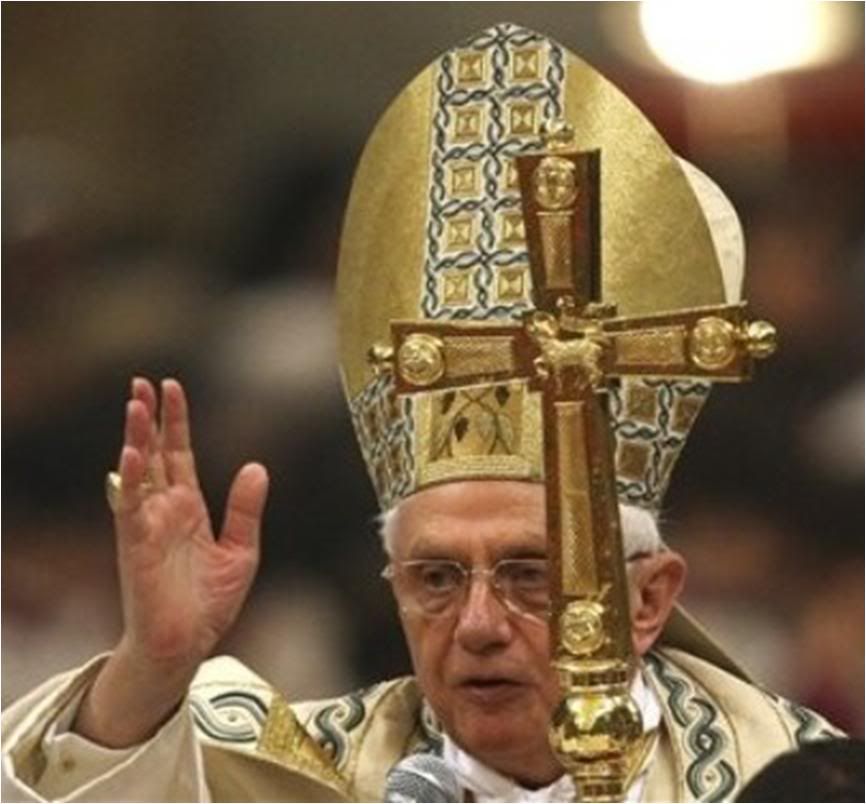 About the celebration
Translated from Notes by
About the celebration
Translated from Notes by

The liturgical celebration of the Conversion of St. Paul highlights the extraordinary power of the grace of God, which is super-abundant where sin is abundant.
The turning point in the life of the apostle happened on the road to Damascus, where the Risen Christ appeared to him, asking, "Saul, Saul why do you persecute me?"
The celebration, already current in Italy as early as the eighth century, entered the Roman calendar of feasts towards the end of the tenth century, and now concludes, very significantly, the Week of Prayer for Christian Unity, reminding us that there is no true ecumenism without conversion (cf. Vatican Council, Decree of ecumenism Unitatis redintegratio, 7).
This year, the theme for reflection and prayer is that of testimony. That is why the Biblical text adopted was the entire Chapter 24 of the Gospel of St. Luke, and the motto for the Week of Prayer was "You are my witnesses to all this" (Lk 24,28).
Vespers was celebrated in the usual manner. This year's program is as follows:
- Greeting by Cardinal Walter Kasper, president of the Pontifical Council for Promoting Christian Unity
- Reading of the Psalmic prayers:
o His Eminence, Metropolitan Gennadios, Orthodox Archbishop of Italy and Malta, and Exarch for Southern Europe
of the Ecumenical Patriarchate
o Rev. Canon David Richardson – Representative of the Archbishop of Canterbury to the Holy See and
director of Rome's Anglican Center
- Biblical Readings:
o Most Rev. Archimandrite Aren Shaheenian. Rector of the Milan and Rome Communities, Apostolic Armenian
Church in Italy
o Rev. Pastor Holger Milkau, Dean of the Evangelical Lutheran
Church in Italy
- Reading of Intercessions
Scholars of the Catholic committee for cultural collaboration, Pontifical Council for Promoting
Christian Unity
- Readinga:
Besides the usual reading for today's Vespers, a passage from Chapter 24 of Luke's Gospel was also read,
in keeping with this year's Biblical theme.
Assisting the Holy Father as Cardinal Deacons were Cardinal Andrea Cordero Lanza di Montezemolo, emeritus
Arch-Priest of St. Paul's Basilica, and Cardinal Giovanni Coppa.
Altar servers were students of the Benedictine Abbey at the Basilica.
Choral music was provided by the Sistine Chapel Choir, and the choir of the Benedictine monks of the Abbey.
At the singing of the Magnificat, the tomb of the Apostle Paul was incensed, along with the Crucifix, the Altar, the Holy Father and the assembly.
Pauses for silence after each Psalm and after the Holy Father's homily are meant to underscore the dimension of prayerful meditation as an integral part of the liturgical celebration.
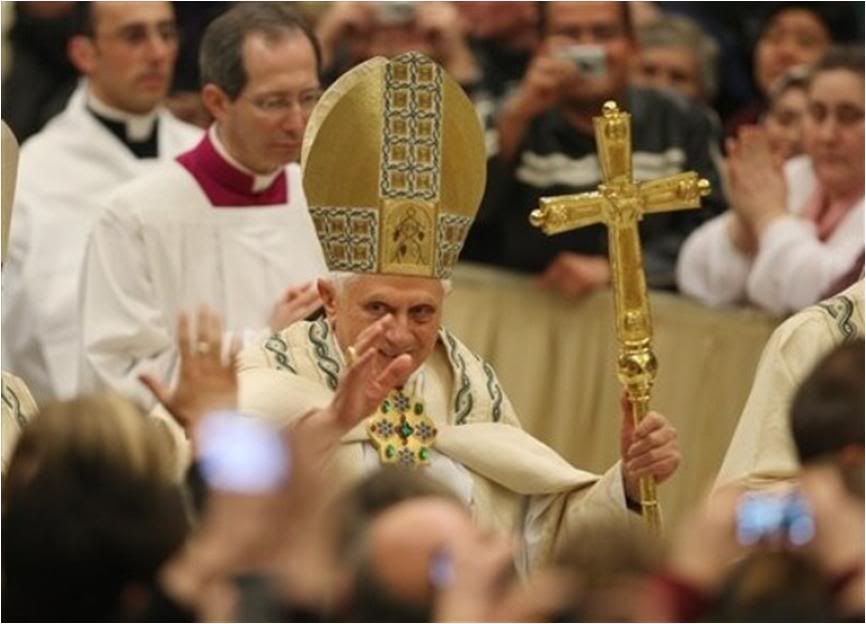 Here is a translation of the Holy Father's homily at Vespers this evening:
Here is a translation of the Holy Father's homily at Vespers this evening:
Dear brothers and sisters,
Gathered together in this fraternal liturgical assembly, on the Feast of the Conversion of the Apostle Paul, we conclude today the Week of Prayer for Christian Unity.
I greet all of you affectionately, especially Cardinal Walter Kasper, president of the Pontifical Council for Promoting Christian Unity; and the Arch-Priest of the Basilica, Mons. Francesco Monterisi, with the Abbot and the community of monks, who are our hosts.
I also address my heartfelt thoughts to the cardinals present, tne bishops, and all the representatives of the Churches and ecclesial communities in the city who are here today.
Not too many months have passed since the conclusion of the Year dedicated to St. Paul, which offered us the opportunity to look deeper into his extraordinary work in preaching the Gospel, and, as the theme of the Week of Prayer for Christian Unity reminds us, "You are witnesses of these things" (Lk 24,48) - of our call to be missionaries of the Gospel.
Paul, although he kept an intense memory of his own past as a persecutor of Christians, did not hesitate to call himself an Apostle. The basis for such a title was, for him, his encounter with the Risen Christ on the road to Damascus, which became the start of tireless missionary activity, in which he would spend his every energy to announce to all peoples the Christ whom he had personally met.
Thus Paul, from being a persecutor of the Church, would himself become a victim of persecution because of the Gospel to which he bore witness.
He writes in the Second Letter to the Corinthians: "Five times at the hands of the Jews I received forty lashes minus one. Three times I was beaten with rods, once I was stoned...; on frequent journeys, in dangers from rivers, dangers from robbers, dangers from my own race, dangers from Gentiles, dangers in the city, dangers in the wilderness, dangers at sea, dangers among false brothers; in toil and hardship, through many sleepless nights, through hunger and thirst, through frequent fastings, through cold and exposure. And apart from these things, there is the daily pressure upon me of my anxiety for all the churches" (2 Cor 11,24-28).
Paul's testimony would reach its peak in his martyrdom, when not far from here, he would prove his faith in Christ who conquers death.
The dynamic in the experience of Paul is the same that we find in the pages of the Gospel we just heard. The disciples of Emmaus, after having recognized the Risen Lord, went back to Jerusalem and found the Eleven gathered together with the others.
The Risen Christ appeared to them, comforted them, won over their fears and doubts, ate a meal with them and opened their hearts to the intelligence of the Scriptures, pointing out what should happen and what would become the nucleus of the Christian announcement.
Jesus affirmed: "Thus it is written that the Messiah would suffer and rise from the dead on the third day and that repentance, for the forgiveness of sins, would be preached in his name to all the nations, beginning from Jerusalem" (Lk 24,46-47).
These are the events that his disciples of the first hour, first of all, and then the followers of Christ in every time and every place, would bear witness to.
It is important, however, to underscore that this testimony, then as now, comes from an encounter with the Risen One, that it is nourished by a constant relation with him, and inspired by profound love for him.
Only he who has experienced Christ present and living - "Look at my hands and my feet, that it is I myself" (Lk 24,39) - sits at table with him, listens to him with ardent heart, can be his witness.
For this, Jesus promised his disciples and each of us powerful assistance from on high, a new presence, that of the Holy Spirit, a gift of the Risen Christ, who guides us to the whole truth: "And (behold) I am sending the promise of my Father upon you" (Lk 24,49), he tells the Eleven and us.
The Eleven would give their whole life to announce the good news of the death and resurrection of the Lord, and almost all of them would seal their testimony with the blood of martyrdom, the fertile seed that has produced such an abundant harvest.
The choice of the theme for the Week of Prayer for Christian Unity this year - the call for a common testimony to the Risen Christ according to the mandate that he entrusted to his disciples - is linked to the observance of the 100th anniversary of the Missionary Conference of Edinburgh, in Scotland, which is considered by many to be a decisive event for the birth of the modern ecumenical movement.
In the summer of 1910, in the Scottish capital, more than a thousand missionaries met, belonging to different branches of Protestantism and Anglicanism, with an Orthodox host, to reflect together on the necessity of reaching unity in order to credibly announce the Gospel of Jesus Christ.
Indeed, it is precisely the desire to announce Christ to others and to bring his message of reconciliation to the world that makes us feel the contradiction of the divisions among Christians. How, in fact, can unbelievers welcome the announcement of the Gospel if Christians, though they call everyone to the same Christ, are in disaccord among themselves?
Moreover, as we know, the Lord himself, at the end of the Lsat Supper, had prayed to the Father for his disciples: "That they may all be one... so that the world may believe" (Jn 17,21).
The communion and the unity of the disciples of Christ is, therefore, a particularly important condition for their testimony to be more credible and effective.
At a distance of one century from the Edinburgh event, the intuition of those courageous precursors is still very actual. In a world marked by religious indifference, and even with growing aversion to the Christian faith, a new intense activity of evangelization is needed, not only among peoples who have never known the Gospel, but even with those among whom Christianity had become widespread and part of their history.
Unfortunately, there is no lack of questions that separate one from the other, which, we hope, can be overcome through prayer and dialog, but there is a central content in the message of Christ that we can all announce together: the fatherhood of God, the victory of Christ over sin and death with his cross and resurrection, trust in the transformative action of the Spirit.
While we are progressing towards full communion, we are called to offer common testimony in the face of the ever more complex challenges of our time, such as secularization and indifference, relativism and hedonism, the sensitive ethical issues regarding the beginning and end of life, the limits of science and technology, dialog with other religious traditions.
There are other areas in which we must henceforth give common witness: safeguarding Creation, promoting the common good and peace, defending the centrality of the human being, commitment to defeat the miseries of our time, such as hunger, indigence, illiteracy, the inequitable distribution of goods and resources.
The commitment for the unity of Christians is not a task only for some, but an accessory activity in the life of the Church. Each is called to give his contribution to achieve those steps that may lead to full communion among all the disciples of Christ, without ever forgetting that it is first of all a gift of God to be invoked constantly.
Indeed, the strength to promote unity and mission flows from the fecund and impassioned encounter with the Risen One, as it was with St. Paul on the road to Damascus, and for the Eleven and other disciples gathered together in Jerusalem.
May the Virgin Mary, Mother of the Church, help to realize as soon as possible the desire of her Son "That they may all be one... so that the world may believe". Amen.
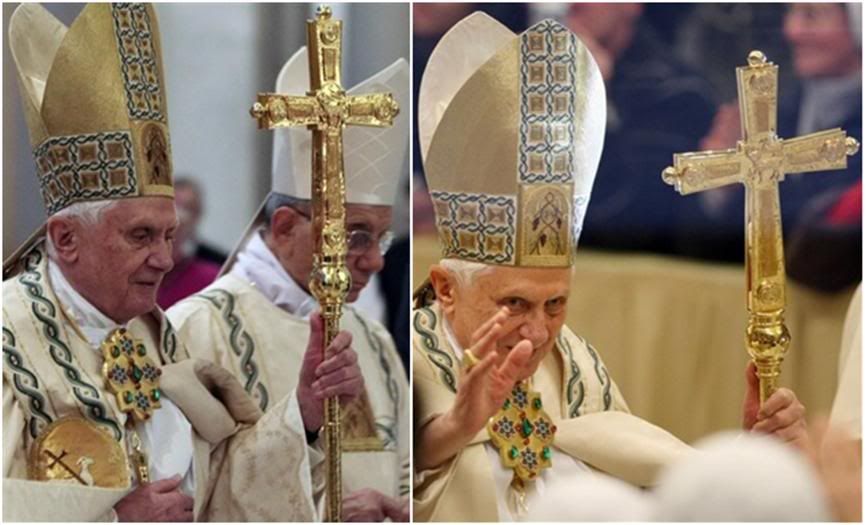
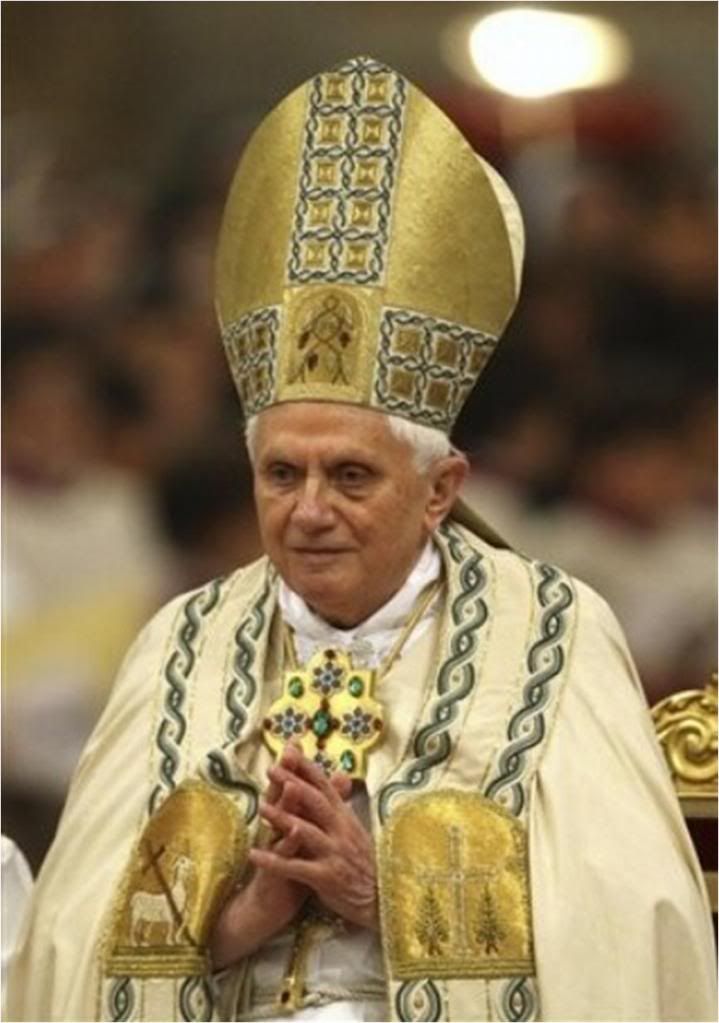
[Modificato da TERESA BENEDETTA 26/01/2010 20:10] |
| |
|
| |
 26/01/2010 10:47 26/01/2010 10:47 |
|
| | | OFFLINE | | Post: 19.346
Post: 1.988 | Registrato il: 28/08/2005
Registrato il: 20/01/2009 | Administratore | Utente Veteran | |
|

 Big rise in Italians trusting
Big rise in Italians trusting
the Church and its work -
many credit Pope's teaching
Translated from

The trust of Italians in the work of volunteer associations and in the Church rose considerably in 2009 compared to 2008 - 82.1% trust volunteer associations (10.8% increase), and 47.3% in the Church (8.5% increase) - according to 'Rapporto Itala 2010', survey to be presented in full on January 29 by the polling group Eurispes.
The poll shows that 47.3% of respondents declare they trust the Church 'enough' or 'much'. Almost one-third (27.8%) of respondents who identified themselves as tending center-right expressed such trust, compared to only 12.9% of those who tend left.
Eurispes also said that "as the Pontificate of Benedict XVI progresses, his message has appeared to penetrate the collective mind for its firmness, lucidity and clarity. It appears that respondents most appreciate the positions taken by the Church under Benedict XVI to issues that are constantly in the news".
[Modificato da TERESA BENEDETTA 26/01/2010 10:49] |
| |
 26/01/2010 13:07 26/01/2010 13:07 |
|
| | | OFFLINE | | Post: 19.347
Post: 1.989 | Registrato il: 28/08/2005
Registrato il: 20/01/2009 | Administratore | Utente Veteran | |
|
 I am glad Angela Ambrogetti wrote this blog entry, as it is the best presentation I have read - limited as all news reports necessarily are - of Cardinal Bagnasco's address to the Italian bishops' Permanent Council.
The Pope and Cardinal Bagnasco
I am glad Angela Ambrogetti wrote this blog entry, as it is the best presentation I have read - limited as all news reports necessarily are - of Cardinal Bagnasco's address to the Italian bishops' Permanent Council.
The Pope and Cardinal Bagnasco
call on Christians to be
witnesses and political movers
Translated from

January 25, 2010
The themes were the usual ones, faultless and undeviating.
In his opening address to the winter meeting of the CEI (Italian bishops conference) permanent council, Cardinal Angelo Bagnasco reviewed the most important developments in the past several months regarding bioethics, protecting the environment, the dignity of immigrants, the successes of the CEI's Cultural Project, without exposing himself in any way.
Which means, without taking on the position of either Secretary of State Tarcisio Bertone nor of his predecessor as CEI president, Cardinal Camillo Ruini, who represent, in Italy today, the Church's two lines of action in society and politics.
[IMHO, Bertone and Ruini do not represent two lines of social and political action for the Church. Their fundamental divergence is whether the Italian bishops should involve themselves directly in the political discourse (Ruini's very successful strategy in over 15 years as CEI president) or should let the Vatican Secretariat of State do that exclusively (which does not make sense, since that organism is concerned with the administration of the universal Church, and who better than the Italian bishops can deal with Italian reality, as against a Secretariat of State which is an international bureaucracy and only happens to be headed by an Italian? In this respect, one can only be happy that Cardinal Bagnasco has not been a pushover, and that apparently, Cardinal Bertone has stopped pushing!]
And just a few days before administrative elections in Italy, with uncertain alliances in each region, 'political' positions have a certain importance.
Bagnasco's low-key speech also took care not to overshadow the other great event today: the Vespers led by the Pope to mark the end of the Week of Prayer for Christian Unity. A coincidence that could perhaps have been avoided, considering that both events were foreseeable.
The Pope called once more for a 'common testimony' by Christians "in the face of the ever more complex challenges of our time such as secularization and indifference, relativism and hedonism, the sensitive ethical issues on the beginning and end of life, the limits of science and technology, the dialog with other religious traditions".
Before Anglicans, Lutherans and Orthodox Christians, the Pope listed the fields for common action: "safeguarding Creation, promoting the common good and peace, defending the centrality of the human being, commitment to defeat the miseries of our time, such as hunger, indigence, illiteracy, the inequitable distribution of goods and resources".
The same issues he brought up at the Rome Synagogue on Sunday, January 17. The same issues Cardinal Bagnasco treated in his address today. Doing so by taking the neutral stance of Italian President Giorgio Napolitano, a sober and moderate style of intervention in civilian society.
In the words of the cardinal:
It does not serve anyone that public confrontation is always systematically reduced to rupture, in the attempt of each side to dominate the other. In the same way, it is insupportable to concentrate only on reciprocal denigration, to the point sometimes of denigrating the entire nation itself simply to make the other side look bad.
Even the media, who should carry out the task of information and verification which is their duty in an evolved society, should not end up in systematic defeatism or in self-inflicted wounding. A journalism of resentment that is based less on facts than on true or imagined conflicts ends up harming even the causes for which it is mobilized.
The nation needs to come out of its own habits of mental laziness, from prejudices cloaked in superiority, to be more conscious of the resources and qualities they have, to give the right consideration to successes that have been achieved, as for instance in the fight against criminality, or in technological excellence, or in medico-scientific research, or in bio-alimentation, or in creative industry.
We must be proud of our own good name, our own good work, of our often selfless commitment, which when it is present, cannot be negated by anyone.
Starting with such premises, it is therefore possible for politics - undertaken in the sense of the greatest work that one can do for others - to give itself the urgent but always postponed objective, to effect expected reforms that can fulfill those institutional, political or structural measures of transition, because further delay simply eats up resources and corrodes enthusiasm.
Very opportunely, the President of the Republic never tires of reminding the political, administrative and judicial classes and their various managerial elements, to set aside individual calculations that are sometimes quite petty, in order to achieve general objectives.
The cardinal kept his equilibrium on the issue of the economy, family support and the 'bad literature' that has left its mark. Then he tackled the issue of immigrants and the recent events in southern Italy involving immigrant farm workers:
Those hovels of cardboard or plastic, without water or electric service, without the minimum hygienic and health requisites, found within abandoned or ruined industrial buildings, exposed to the inclement weather and invaded by mud flows, demonstrate an unacceptable standard: it cannot be so. It is inhuman.
It is realistic to think that in contexts like these, serious attempts at integration cannot take root even as parallel and self-referential pieces of society take on a life of their own, about which tensions and micro-conflicts are inevitable, but end up weighing heavily on the perception of immigrants by native citizens.
As always, the cardinal goes beyond politics, in keeping with the theme of the conference on 'God today' - which was Cardinal Ruini's big 'comeback' to the limelight, and reproposes the Pope's suggestion to the Roman Curia with the image of a 'court of teh Gentiles' as a place for encounter with non-believers.
He ended his address preceding three days of work by the CEI Plenary Assembly with a wish which was as general as it is necessary:
I wish that this season can contribute to the emergence of a new generation of Italians and Catholics who, in the midst of today's cultural anguish and equipping themselves to cope sensibly with it, feel that public issues are important and elevated, insofar as they can shape the fate of everyone, and therefore are ready to give the best of themselves, their thoughts, their plans, their days - Italians and believers who realize their responsibility before God as decisive for political action.
Thus, Bagnasco kept perfect equilibrium while awaiting how things will develop but it was an occasion to remind Italian bishops that "each one is called on to repel the intimidations of secularism".
And in line with the Pope's message at St. Paul's today, an invitation for "a new and intense work of evangelization, not only among peoples who have never known the Gospel, but also those for whom Christianity is widespread and part of their history".
I have always regretted not having the time to translate Cardinal Bagnasco's interventions in full. Like Cardinal Ruini before him, he is always sensible, insightful and eloquent, whether he is addressing spiritual, philosophical, pastoral or routine practical issues. And although his interventions are necessarily focused on Italian affairs, much of it has universal resonance for Catholics.
[Modificato da TERESA BENEDETTA 26/01/2010 13:09] |
| |
 26/01/2010 19:19 26/01/2010 19:19 |
|
| | | OFFLINE | | Post: 19.348
Post: 1.990 | Registrato il: 28/08/2005
Registrato il: 20/01/2009 | Administratore | Utente Veteran | |
|
 Tuesday, January 26
Tuesday, January 26
 SAINTS TIMOTHY AND TITUS (1st century AD), Disciples of St. Paul, Bishops
SAINTS TIMOTHY AND TITUS (1st century AD), Disciples of St. Paul, Bishops
Timothy and Titus are both mentioned by St. Paul several times in his letters, especially Timothy, and in fact, two letters to Timothy
and one to Titus are part of the New Testament. Pope Benedict XVI dedicated his catechesis on December 13, 2006, to them, following
his catecheses on the Twelve Apostles and Paul himself. Both were Greek-born (Though Timothy's mother was Jewish), met up with Paul
during his missionary travels, and travelled with him or were sent on missions by him. Paul's affection and confidence in his two
disciples is evident in his letters. Indeed, Timothy went on to be Bishop of Ephesus, and Titus, Bishop of Crete. Legend says that
St. John first came to stay with Timothy in Ephesus before he was exiled to Patmos. The Orthodox Church also venerates Timothy as
a martyr, because it is said he was stoned to death (around 80 AD) by pagans who protested a Christian procession led by him. Titus
apparently lived peacefully to age 95 (around 107 AD).
Readings for today's Mass:
www.usccb.org/nab/readings/012610.shtml
A small digression: While searching for Timothy and Titus images, I came upon a videogame
named after them, as a teaching tool by a Christian company.

The player is supposed to help T&T look for Romans who have stolen some of Paul's letters.
In the process, it provides information about the places that the disciples travelled to
and appropriate Biblical passages.
OR for 1/25/-1/26/10:
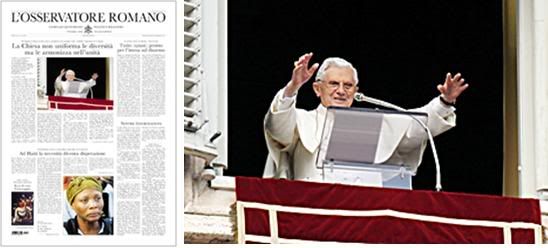
At the Sunday Angelus, Benedict XVI says communion among Christians
will make the Gospel announcement more credible:
'The Church does not level out diversity but harmonizes them in unity'
He also calls for 'peaceful and just solutions' to immigrants' problems
Other Page 1 stories: "Everything is (almost) ready for an intention to disarm" by the US and Russia
[a weird headline for a non-news development that is being reported like grasping at straws in the wind!
Mr. Vian is resorting to editorial stratagem because he took it for granted that the US-Russia disarmament
treaty would be automatically renewed when it expired last month, completely ignoring that Russia is playing
out every chance it can get to assert itself on the world stage, and delaying this treaty renewal is one way
to do that]; and in Haiti, need becomes desperation [not for lack of assistance, but because of the extreme
difficulty of moving aid promptly to the victims when the entire city and its infrastructure has been made
almost completely non-functional] NB: The newspaper came out before the Vespers yesterday at St. Paul,
so, that event is not reported except for a note that it would take place.
No events scheduled for the Holy Father today.
Vatican philately office to
raise funds for Haiti

The Governatorate of Vatican City State has announced that it is launching a special initiative, through its Philately Office, to raise funds for the Haitians struck by the earthquake earlier this month.
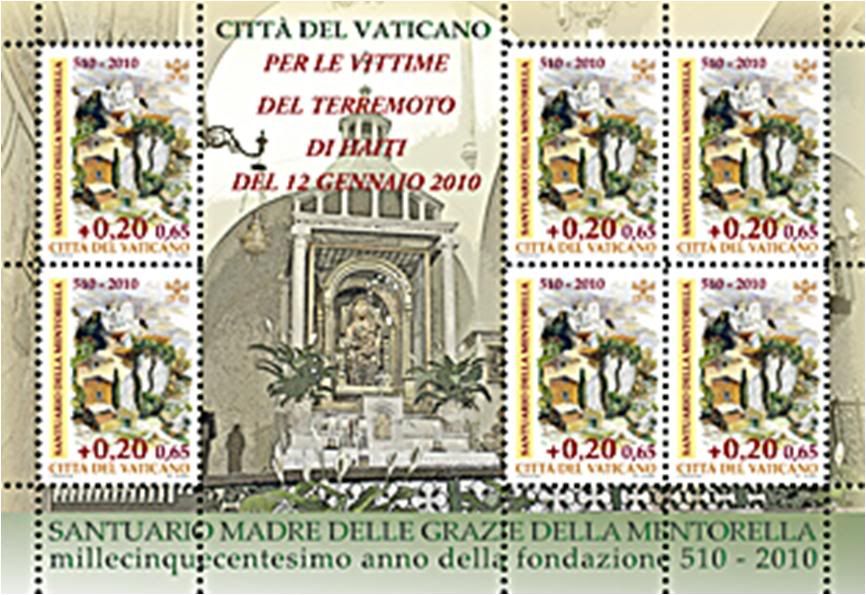
The Vatican will issue a special surcharge on a Vatican stamp this year commemorating the 1500th anniversary of the founding of the Shrine of the Madonna delle Graazie in Mentorella near Rome.
900,000 stamps with a face value of 0.65 Eurocents will be sold for an additional 0.20 Eurocents each. A total surcharge of 150,000 Euros is expected.
Christian Unity Council denounces
leak of unauthorized draft of
Catholic-Orthodox discussion points
regarding the Petrine primacy
Translated from
the Italian service of

January 26, 2010
The Pontifical Council for Promoting Christian Unity notes 'with great regret' the unauthorized publication of a draft text that is being considered by the Mixed International Commission for Theological Dialog between the Catholic Church and the Orthodox Churches as a whole.
[The text was posted yesterday by Sandro Magister on his www.chiesa site - See accompanying article and link posted on this thread at the bottom of the preceding page, p. 62]
A note from the Council states that "it was a draft which consisted on a list of points to be studied and analyzed, and until now, only discussed minimally by the Commission".
In the last meetings of the Commission held in Paphos, Cyprus, last October, the note says further, "it was expicitly agreed that the text would not be published until it had been examined by the entire membership."
For now, the note concludes, "no document has been agreed on, therefore the published text has no authority nor official character".
[Modificato da TERESA BENEDETTA 27/01/2010 19:31] |
| |
 27/01/2010 02:44 27/01/2010 02:44 |
|
| | | OFFLINE | | Post: 19.350
Post: 1.992 | Registrato il: 28/08/2005
Registrato il: 20/01/2009 | Administratore | Utente Veteran | |
|


 All my misgivings about Rome's Chief Rabbi have returned - I gave him the benefit of the doubt during the Pope's visit to the Synagogue, when he had seemed, apart from a couple of statements in his speech, to have been a gracious host on the whole. After all, he had apparently worked to have the visit take place despite objections from some in his community. But his statements since then have returned to his more familiar bellicose and unnecessarily provocative, often offensive, persona.
Rome's Chief Rabbi more offensive
All my misgivings about Rome's Chief Rabbi have returned - I gave him the benefit of the doubt during the Pope's visit to the Synagogue, when he had seemed, apart from a couple of statements in his speech, to have been a gracious host on the whole. After all, he had apparently worked to have the visit take place despite objections from some in his community. But his statements since then have returned to his more familiar bellicose and unnecessarily provocative, often offensive, persona.
Rome's Chief Rabbi more offensive
than ever - now finds fault with
John Paul's reference to the Jews
as 'older brothers' in the faith

ROME, January 26 (Translated from Apcom) - "If peace with the Lefebvrians means renouncing the openings made by Vatican II, the Church should choose - us [the Jews] or them [the Lefbevrians]!"
This was declared by the Chief Rabbi of Rome, Riccardo Di Segni, in an interview with the monthly magazine Il consulente Re in the issue that came out today, eve of the World Day to commemorate The Holocaust.
[The statement is offensive, and completely and unnecessarily provocative, because it rests on two wrong premises: 1) How many times does Benedict XVI have to say that the teaching of Vatican-II, particularly with regard to the Jews, is 'irrevocable'? - so Di Segni's scenario that the Church would 'renounce' such teachings is highly improbable if not downright impossible; and 2) There is no 'either-or' here for the Church. The Pope reaching out to the Lefebvrians has nothing to do with the Church's position on the Jews since Nostra aetate. The burden is with the Lefebvrians to accept the teachings of Vatican-II that they wish clarified.]
In this regard, Di Segni recalled the statement he made at the Synagogue referring to the 'opening' of Vatican-II: "If it should ever come under question, then there will be no more possibility of dialog." [Which was already a gratuitous comment then.]
The rabbi now explains: "It was a last minute addition, after the Pope remarks to the Congregation for the Doctrine of the Faith on the morning of January 15 - when there was a strange opening to the Lefebvrians."
[First of all, the Pope said exactly one sentence about the Lefebvrians on that occasion, preceded by a general statement about Christian unity:
Arriving at a common testimonial to faith by all Christians thus constitutes the priority of the Church in every age, in order to lead all men to an encounter with God.
In this spirit, I have particular confidence in the dicastery's commitment to overcome the doctrinal problems that remain before the Fraternity of St. Pius X can return to full communion with the Church.
What is strange is how the above sentence can ring any alarm bells at all, and why Di Segni should consider it 'a strange opening to the Lefebvrians' since it doesn't say one iota more or less than what Benedict XVI has made known since he met with Mons. Fellay in September 2005.]
In general, Di Segni adds, the path ahead for Jews and Catholics "will be troubled without a doubt, but that it is irreversible is a hope".
As for the formulation made by John Paul II to describe the Jews as "our older brothers", Di Segni says: "This definition is very ambiguous from the theological point of view, because 'older brothers' in the Bible - and I discussed this in my speech at the Synagogue - are the 'bad ones', those who claim the advantage of being firstborn... And so, to speak of 'older brothers' means, theologically, to say: "You were once, but now that does not mean anything!"
[This is perhaps the most unexpected and unforgivable statement made by Di Segni - to ascribe anything but good will and authentic deference to John Paul II when he used those words 'our older brothers', whose sense was very clear and unique - that Jews recognized and accepted the one God long before there were Christians! After 25 years, someone from among the Jews suddenly levels this absurd charge against the man they have elevated almost to a special cult precisely because of the affection and deference embodied in those words!]
His references to the series of brothers in the Bible in which the older one was the 'bad' one, Di Segni claims, struck the Pope: " From the hieratic pose which he had held from the start of the ceremony, he started to show great interest". ['Hieratic pose', 'started to show great interest'! - You would think the Pope had come to the Synagogue as some condescending figure, who only 'started to show great interest' because Di Segni had said something provocative! Anyone who watched the telecast can belie that! And who's the really condescending one here?]
"Also, at the end of my speech, he told me the argument was very important, and he deMonstrated this again during our private conversation."
At the end, Di Segni praised the Sant'Egidio Community: "They provide a beautiful example of collaboration. They have been fundamental in that they did all they could to promote this visit - they did a lot to salvage it during the moment of crisis" [After the Holy Father proclaimed the heroic virtues of Pius XII.]
If one were to be as malicious as Di Segni habitually is, one would say that he is being an agent provocateur/agitpropmeister to keep Jewish causes alive, especially the Shoah, and where Catholics are concerned, Pius XII and a barely concealed skepticism about Catholic goodwill and sincerity towards the Jews - for instance, always casting doubt on Benedict XVI's sincerity - for all his avowals of hope, blahblahblah...
To put it more bluntly, he is constantly headline-baiting, as though to say something inflammatory about Benedict XVI, Pius XII or the Church in general were the one sure way for him - and his causes - to get into the news at all. How otherwise could a community of 40,000 call attention to itself in a nation of 60 million?
[Modificato da TERESA BENEDETTA 27/01/2010 02:59] |
| |
 27/01/2010 03:52 27/01/2010 03:52 |
|
| | | OFFLINE | | Post: 19.352
Post: 1.994 | Registrato il: 28/08/2005
Registrato il: 20/01/2009 | Administratore | Utente Veteran | |
|
 When will the Pope name
When will the Pope name
the next batch of cardinals?

Vatican City, Jan 26, 2010 (CNA) - Citing the high number of cardinals reaching 80 years of age, Vatican experts say the possibility of a consistory taking place soon is becoming ever more likely. By the end of March 2010, there will be no fewer than 12 positions available for the elevation of new cardinals.
Cardinals reaching the age of 80 are no longer able to vote in the election of a new Pope, should the occasion arise. Currently there are 182 members of the College of Cardinals, spanning all ages, with 112 eligible to vote in Papal conclaves.
The traditional number of cardinal electors is 120.
In addition to the eight cardinals who have already reached the 80-year ceiling, this Wednesday Archbishop Emeritus of Toronto, Cardinal Aloysius Ambrozic, will celebrate his birthday, thus losing his vote in Papal conclaves and clearing the way for the creation of a new cardinal.
Within the next two months, three more cardinals including American Cardinal Adam Maida will celebrate birthdays and also reach the mark.
According to the experts, this puts Pope Benedict XVI in an interesting situation, with no other cardinal celebrating his 80th until July and an additional 13 reaching the milestone between then and March of 2011. Therefore, an immediate consistory called for by the Pope around the end of February or the beginning of March wouldn't be a surprise, with another consistory to follow around the same dates next year.
Included among the 25 cardinals that will reach the limit in the next 13 months are Archbishop Emeritus of Washington D.C., Cardinal Theodore McCarrick and Archbishop Emeritus of Baltimore, Cardinal William Keeler.
|
| |
 27/01/2010 12:57 27/01/2010 12:57 |
|
| | | OFFLINE | | Post: 19.354
Post: 1.996 | Registrato il: 28/08/2005
Registrato il: 20/01/2009 | Administratore | Utente Veteran | |
|
 Wednesday, January 27
Wednesday, January 27
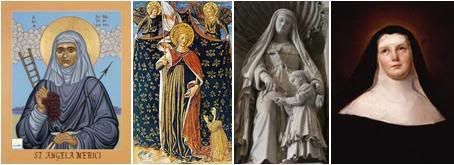 Middle photos: Painting by Bozzoli, and statue in St. Peter's Basilica.
ST. ANGELA MERICI (Italy, 1470-1740)
Middle photos: Painting by Bozzoli, and statue in St. Peter's Basilica.
ST. ANGELA MERICI (Italy, 1470-1740)
Third-Order Franciscan, Founder, Company of St. Ursula
Born in Desenzano by Lake Garda, Angela spent most of her life in nearby Brescia. Early on,
she became interested in educating poor children and joined the Third Order of St. Francis
for laywomen. In 1524, she was on her way to visit the Holy Land and was said to have gone
suddenly blind in Cyprus. She proceeded with the pilgrimage anyway, and on her way back to
Italy, is said to have regained her sight in the same place in Cyprus where she went blind.
At the age of 62, she founded the Company of St. Ursula, named after the patron saint of
medieval universities, dedicated to 're-Christianising family life' through educating girls to be
Christian wives and mothers. The Ursulines were the first teaching congregation of sisters, but
they remained 'secular' - not living in communities - for 17 years before seeking recognition
as an order. Their sisters have since then had the choice to be 'religious' or enclosed nuns, or
'congregated' who follow the original plan. Ursulines were the first missionary nuns to Canada
and what is now the United States. Today, Ursuline educational institutions are found worldwide.
Mother Angela was canonized in 1807.
Readings for today's Mass: www.usccb.org/nab/readings/012710.shtml
OR today.
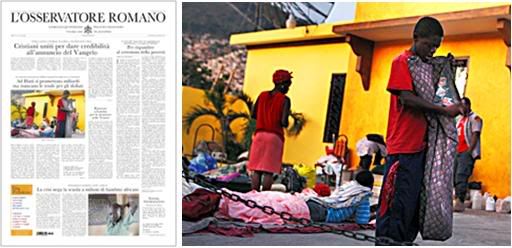 Page 1 photo above, Gauguin-like photo of homeless couple in Port au Prince. Below left, Vespers at St. Paul's on Monday,
Page 1 photo above, Gauguin-like photo of homeless couple in Port au Prince. Below left, Vespers at St. Paul's on Monday,
and right, 1910 Edinburgh Conference which started the modern ecumenical movement.
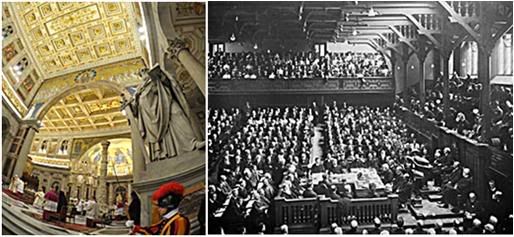
Pope concludes the Week of Prayer for Christian Unity
'United, Christians give credibility to Gospel announcement'
Other Page 1 stories: The role of the Holy See in promoting Millennium Development Goals
(MDG); international community sets first-decade reconstruction goals for Haiti but
immediate need is for tents to house some 2 million homeless; how millions of African
children are missing out on education due to ongoing wars.
THE POPE'S DAY
General Audience today - The Holy Father dedicated his catechesis to St. Francis of Assisi
as a 'giant of sanctity' in his teaching cycle on the great Christian figures of the Middle Ages.
He also paid homage to the victims of Nazism on this World Day to commemorate the Holocaust.
After all the recurrent and repeated accusations in the past five years against Benedict XVI by fault finders who behave as though Joseph Ratzinger should take upon himself the full weight of guilt for the Holocaust because he is German and still alive (therefore, a more immediate scapegoat than Pius XII) - how infinitely moving it is to read once more the address he delivered in Auschwitz-Birkenau in 2006! His pilgrimage to Auschwitz, I think, is the most memorable and emotion-laden event so far of his Pontificate.
The occasion was unique and unrepeatable. No other German who lived in the Nazi years has been and will be Pope. No rainbow was perhaps more significant since the rainbow that came to Noah as a sign that the Great Deluge was a thing of the past. One had hoped it would be a sign of an end to recriminations over the Holocaust, but it was not to be. .
LOOKING BACK:
BENEDICT XVI IN AUSCHWITZ-BIRKENAU, 5/28/06
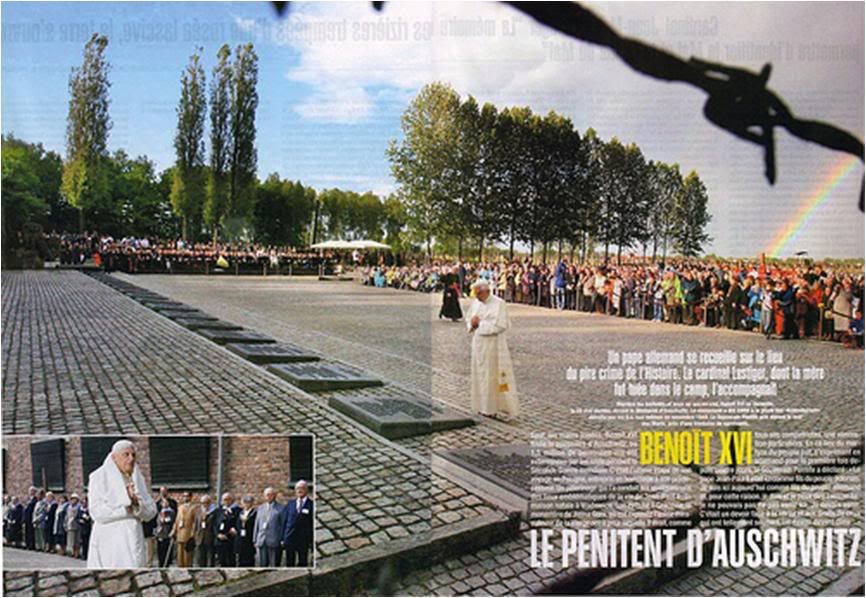 The Holy Father delivered this address in Italian after saying a prayer in German.
The Holy Father delivered this address in Italian after saying a prayer in German.
To speak in this place of horror, in this place where unprecedented mass crimes were committed against God and man, is almost impossible - and it is particularly difficult and troubling for a Christian, for a Pope from Germany.
In a place like this, words fail; in the end, there can only be a dread silence - a silence which is itself a heartfelt cry to God: Why, Lord, did you remain silent? How could you tolerate all this?
In silence, then, we bow our heads before the endless line of those who suffered and were put to death here; yet our silence becomes in turn a plea for forgiveness and reconciliation, a plea to the living God never to let this happen again.
Twenty-seven years ago, on 7 June 1979, Pope John Paul II stood in this place. He said: “I come here today as a pilgrim. As you know, I have been here many times. So many times! And many times I have gone down to Maximilian Kolbe’s death cell, paused before the execution wall, and walked amid the ruins of the Birkenau ovens. It was impossible for me not to come here as Pope.”
Pope John Paul came here as a son of that people which, along with the Jewish people, suffered most in this place and, in general, throughout the war. “Six million Poles lost their lives during the Second World War: a fifth of the nation”, he reminded us.
Here too he solemnly called for respect for human rights and the rights of nations, as his predecessors John XXIII and Paul VI had done before him, and added: “The one who speaks these words is ... the son of a nation which in its history has suffered greatly from others. He says this, not to accuse, but to remember. He speaks in the name of all those nations whose rights are being violated and disregarded ...”.
Pope John Paul II came here as a son of the Polish people. I come here today as a son of the German people. For this very reason, I can and must echo his words:
I could not fail to come here. I had to come. It is a duty before the truth and the just due of all who suffered here, a duty before God, for me to come here as the successor of Pope John Paul II and as a son of the German people - a son of that people over which a ring of criminals rose to power by false promises of future greatness and the recovery of the nation’s honour, prominence and prosperity, but also through terror and intimidation, with the result that our people was used and abused as an instrument of their thirst for destruction and power.
Yes, I could not fail to come here. On 7 June 1979 I came as the Archbishop of Munich-Freising, along with many other Bishops who accompanied the Pope, listened to his words and joined in his prayer.
In 1980 I came back to this dreadful place with a delegation of German Bishops, appalled by its evil, yet grateful for the fact that above its dark clouds the star of reconciliation had emerged.
This is the same reason why I have come here today: to implore the grace of reconciliation - first of all from God, who alone can open and purify our hearts, from the men and women who suffered here, and finally the grace of reconciliation for all those who, at this hour of our history, are suffering in new ways from the power of hatred and the violence which hatred spawns.
How many questions arise in this place! Constantly the question comes up: Where was God in those days? Why was he silent? How could he permit this endless slaughter, this triumph of evil?
The words of Psalm 44 come to mind, Israel’s lament for its woes: “You have broken us in the haunt of jackals, and covered us with deep darkness ... because of you we are being killed all day long, and accounted as sheep for the slaughter. Rouse yourself! Why do you sleep, O Lord? Awake, do not cast us off forever! Why do you hide your face? Why do you forget our affliction and oppression? For we sink down to the dust; our bodies cling to the ground. Rise up, come to our help! Redeem us for the sake of your steadfast love!” (Ps 44:19, 22-26).
This cry of anguish, which Israel raised to God in its suffering, at moments of deep distress, is also the cry for help raised by all those who in every age - yesterday, today and tomorrow - suffer for the love of God, for the love of truth and goodness. How many they are, even in our own day!
We cannot peer into God’s mysterious plan - we see only piecemeal, and we would be wrong to set ourselves up as judges of God and history. Then we would not be defending man, but only contributing to his downfall.
No - when all is said and done, we must continue to cry out humbly yet insistently to God: Rouse yourself! Do not forget mankind, your creature!
And our cry to God must also be a cry that pierces our very heart, a cry that awakens within us God’s hidden presence - so that his power, the power he has planted in our hearts, will not be buried or choked within us by the mire of selfishness, pusillanimity, indifference or opportunism.
Let us cry out to God, with all our hearts, at the present hour, when new misfortunes befall us, when all the forces of darkness seem to issue anew from human hearts: whether it is the abuse of God’s name as a means of justifying senseless violence against innocent persons, or the cynicism which refuses to acknowledge God and ridicules faith in him.
Let us cry out to God, that he may draw men and women to conversion and help them to see that violence does not bring peace, but only generates more violence - a morass of devastation in which everyone is ultimately the loser.
The God in whom we believe is a God of reason - a reason, to be sure, which is not a kind of cold mathematics of the universe, but is one with love and with goodness.
We make our prayer to God and we appeal to humanity, that this reason, the logic of love and the recognition of the power of reconciliation and peace, may prevail over the threats arising from irrationalism or from a spurious and godless reason.
The place where we are standing is a place of memory. The past is never simply the past. It always has something to say to us; it tells us the paths to take and the paths not to take.
Like John Paul II, I have walked alongside the inscriptions in various languages erected in memory of those who died here: inscriptions in Belarusian, Czech, German, French, Greek, Hebrew, Croatian, Italian, Yiddish, Hungarian, Dutch, Norwegian, Polish, Russian, Romani, Romanian, Slovak, Serbian, Ukrainian, Judaeo-Spanish and English.
All these inscriptions speak of human grief, they give us a glimpse of the cynicism of that regime which treated men and women as material objects, and failed to see them as persons embodying the image of God.
Some inscriptions are pointed reminders. There is one in Hebrew. The rulers of the Third Reich wanted to crush the entire Jewish people, to cancel it from the register of the peoples of the earth.
Thus the words of the Psalm: “We are being killed, accounted as sheep for the slaughter” were fulfilled in a terrifying way. Deep down, those vicious criminals, by wiping out this people, wanted to kill the God who called Abraham, who spoke on Sinai and laid down principles to serve as a guide for mankind, principles that are eternally valid.
If this people, by its very existence, was a witness to the God who spoke to humanity and took us to himself, then that God finally had to die and power had to belong to man alone - to those men, who thought that by force they had made themselves masters of the world.
By destroying Israel, they ultimately wanted to tear up the taproot of the Christian faith and to replace it with a faith of their own invention: faith in the rule of man, the rule of the powerful.
Then there is the inscription in Polish. First and foremost they wanted to eliminate the cultural elite, thus erasing the Polish people as an autonomous historical subject and reducing it, to the extent that it continued to exist, to slavery.
Another inscription offering a pointed reminder is the one written in the language of the Sinti and Roma people. Here too, the plan was to wipe out a whole people which lives by migrating among other peoples. They were seen as part of the refuse of world history, in an ideology which valued only the empirically useful; everything else, according to this view, was to be written off as lebensunwertes Leben - life unworthy of being lived.
There is also the inscription in Russian, which commemorates the tremendous loss of life endured by the Russian soldiers who combated the Nazi reign of terror; but this inscription also reminds us that their mission had a tragic twofold aim: by setting people free from one dictatorship, they were to submit them to another, that of Stalin and the Communist system.
The other inscriptions, written in Europe’s many languages, also speak to us of the sufferings of men and women from the whole continent.
They would stir our hearts profoundly if we remembered the victims not merely in general, but rather saw the faces of the individual persons who ended up here in this abyss of terror.
I felt a deep urge to pause in a particular way before the inscription in German. It evokes the face of Edith Stein, Theresia Benedicta a Cruce: a woman, Jewish and German, who disappeared along with her sister into the black night of the Nazi-German concentration camp; as a Christian and a Jew, she accepted death with her people and for them.
The Germans who had been brought to Auschwitz-Birkenau and met their death here were considered as Abschaum der Nation - the refuse of the nation. Today we gratefully hail them as witnesses to the truth and goodness which even among our people were not eclipsed. We are grateful to them, because they did not submit to the power of evil, and now they stand before us like lights shining in a dark night.
With profound respect and gratitude, then, let us bow our heads before all those who, like the three young men in Babylon facing death in the fiery furnace, could respond: “Only our God can deliver us. But even if he does not, be it known to you, O King, that we will not serve your gods and we will not worship the golden statue that you have set up” (cf. Dan 3:17ff.).
Yes, behind these inscriptions is hidden the fate of countless human beings. They jar our memory, they touch our hearts. They have no desire to instil hatred in us: instead, they show us the terrifying effect of hatred.
Their desire is to help our reason to see evil as evil and to reject it; their desire is to enkindle in us the courage to do good and to resist evil. They want to make us feel the sentiments expressed in the words that Sophocles placed on the lips of Antigone, as she contemplated the horror all around her: my nature is not to join in hate but to join in love.
By God’s grace, together with the purification of memory demanded by this place of horror, a number of initiatives have sprung up with the aim of imposing a limit upon evil and confirming goodness.
Just now I was able to bless the Centre for Dialogue and Prayer. In the immediate neighbourhood the Carmelite nuns carry on their life of hiddenness, knowing that they are united in a special way to the mystery of Christ’s Cross and reminding us of the faith of Christians, which declares that God himself descended into the hell of suffering and suffers with us.
In Oswiecim is the Centre of Saint Maximilian Kolbe, and the International Centre for Education about Auschwitz and the Holocaust. There is also the International House for Meetings of Young people. Near one of the old Prayer Houses is the Jewish Centre. Finally the Academy for Human Rights is presently being established.
So there is hope that this place of horror will gradually become a place for constructive thinking, and that remembrance will foster resistance to evil and the triumph of love.
At Auschwitz-Birkenau humanity walked through a “valley of darkness”. And so, here in this place, I would like to end with a prayer of trust - with one of the Psalms of Israel which is also a prayer of Christians:
“The Lord is my shepherd, I shall not want. He makes me lie down in green pastures; he leads me beside still waters; he restores my soul. He leads me in right paths for his name’s sake. Even though I walk through the valley of the shadow of death, I fear no evil; for you are with me; your rod and your staff - they comfort me ... I shall dwell in the house of the Lord my whole life long” (Ps 23:1-4, 6).
[Modificato da TERESA BENEDETTA 29/01/2010 18:37] |
| |
 27/01/2010 14:13 27/01/2010 14:13 |
|
| | | OFFLINE | | Post: 19.355
Post: 1.997 | Registrato il: 28/08/2005
Registrato il: 20/01/2009 | Administratore | Utente Veteran | |
|
 GENERAL AUDIENCE TODAY
GENERAL AUDIENCE TODAY
At the General Audience today held in Aula Paolo VI, Pope Benedict XVI resumed his catechetical cycle on the Christian culture of the Middle Ages with a lesson on St. Francis of Assisi.
Here is how he synthesized the catechesis in English:
Continuing our catechesis on the Christian culture of the Middle Ages, we now turn to Saint Francis of Assisi, one of the greatest figures of the Church’s history.
The story of Saint Francis’s life and conversion, and his complete devotion to Christ, the poor and the suffering, is well known. After gathering a small group of companions and followers, including Saint Clare, Francis sought the approval of Pope Innocent III for his movement which was completely committed to the renewal of the Church in holiness and to the preaching of the Gospel.
Near the end of his life, Francis’s configuration to the Crucified Lord culminated in his reception of the stigmata at La Verna. His deep piety found expression in a great devotion to the Eucharist, as the sacrament of Christ’s real presence, and his love for creation as God’s handiwork.
The life and teaching of Saint Francis have inspired countless people to the imitation of Christ through the embrace of inward and outward poverty. May his example teach us ever greater love for the Lord and his Church, and help us to know the immense spiritual joy born of the imitation of Christ and the pursuit of holiness.
At the end of his plurilingual greetings to various pilgrim groups, the Holy Father had a special message to mark the worldwide Holocaust Memorial Day today:
Seventy-five years ago, on January 27, 1945, the gates of the Nazi concentration camp in the Polish city of Oswiecim - known to the world by its German name Auschwitz - were opened to the world, and its few survivors were liberated.
That event and the testimony of the survivors revealed to the world the horrors of the crimes, whose heinousness was hitherto unheard of, committed in the extermination camps created by Nazi Germany.
Today, we celebrate the Day of Memory in honor of all the victims of those crimes, particularly the planned annihilation of the Jewish people, and in honor of those who risked their own lives to protect the victims of persecution and opposed the homicidal folly.
With spirits moved by the memory, let us think of the innumerable victims of a blind racial and religious hatred who underwent deportation, imprisonment and death in those aberrant and inhuman places.
May the remembrance of such deeds, particularly the tragedy of the Shoah which struck the Jewish people, inspire an ever more solid respect for the dignity of every person, so that all men may feel themselves to be one big family.
May the almighty God enlighten hearts and minds so that such tragedies may never again be repeated.
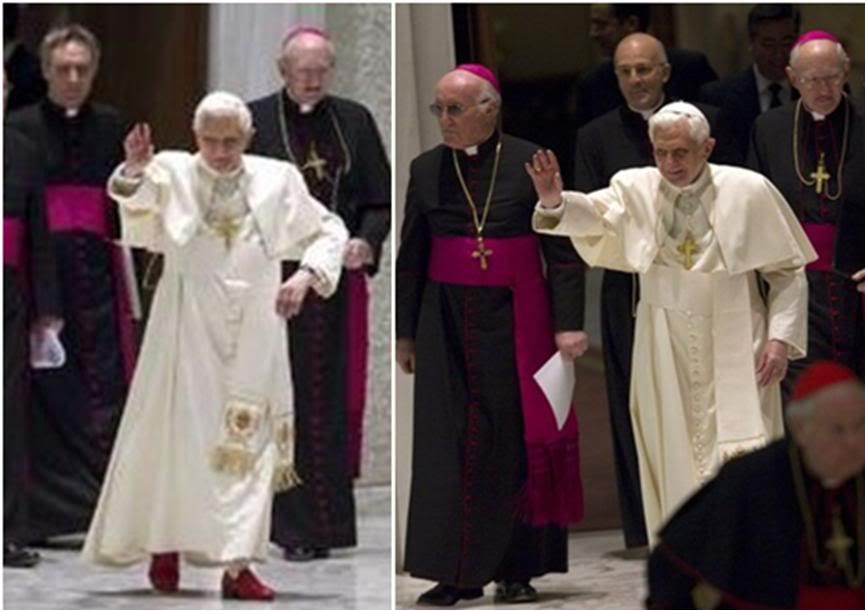
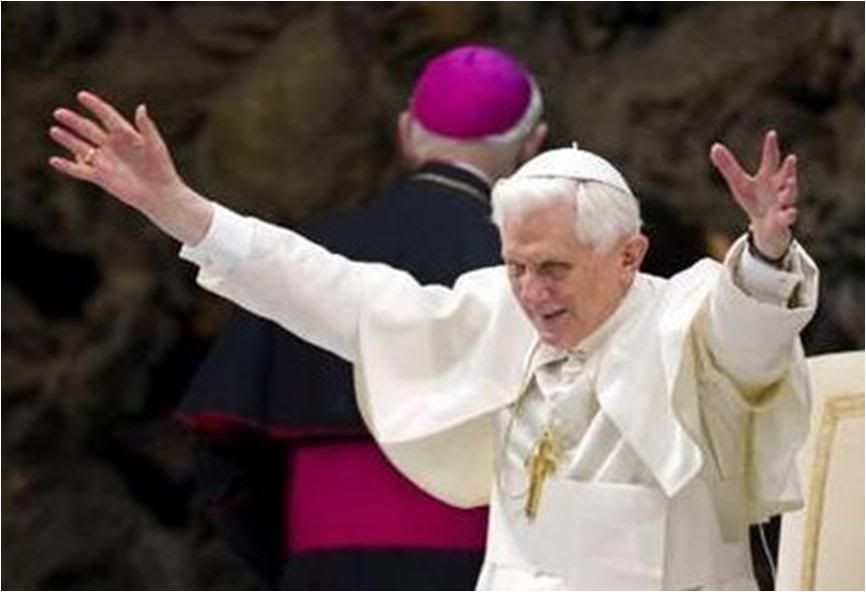
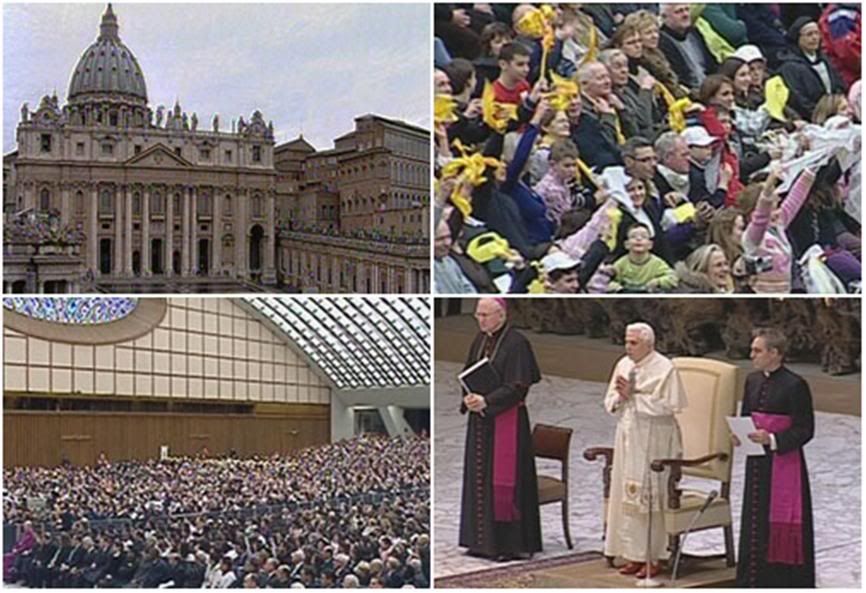
Here is a full translation of the Holy Father's catechesis:

Dear brothers and sisters:
In a recent catechesis, I illustrated the providential role of the Order of Friars Minor and the Order of Preachers - founded, respectively, by Saint Francis of Assisi and St. Domingo de Guzman - in the renewal of the Church in their time.
Today, I wish to present to you the figure of Francis, an authentic 'giant' of sanctity who continues to fascinate so many persons of every age and every religion.
"A sun is born in the world" - With these words in the Divine Comedy (Paradise, Canto XI), the supreme Italian poet Dante Alighieri referred to the birth of Francis, which took place towards the end of 1181 or the start of 1182 in Assisi.
Born to a rich family - his father was a merchant in fabrics - Francis had a carefree adolescence and youth, cultivating the knightly ideals of the time. At age 20, he took part in a military campaign and was taken prisoner. He fell ill and was set free.
After returning to Assisi, he began the slow process of spiritual conversion which led him to gradually abandon the worldly lifestyle that he had practised till then.
Dating back to this time were the famous episodes of his encounter with a leper - to whom, Francis, dismounting from his horse, gave a kiss of peace; and of the message from the Crucifix in the little church of San Damiano.
Three times, Christ on the Cross came to life and said to him: "Go, Francis, repair my church which is in ruins".
These simple words of the Lord heard in the church of San Damiano hide a profound symbolism. At that moment, Francis was called to repair the church itself, but the ruinous state of San Damiano was a symbol of the tragic and disquieting situation of the Church itself in that time, with a superficial faith that failed to form or transform life, with a clergy that showed little zeal, with the chilling of love - an interior destruction of the Church which also meant a decomposition of its unity with the birth of heretical movements.
Nonetheless, at the center of that Church in ruins was the Crucified Lord who spoke: He called for renewal, he called on Francis to do manual labor in order to concretely repair that little church of San Damiano, symbol of the more profound call to renew the Church of Christ itself, with his radical faith and the enthusiasm of his love for Christ.
This event, which took place probably in 1205, would harken forward to a similar event in 1207: the dream of Pope Innocent III. He saw in a dream that the Basilica of St. John Lateran, mother church of all churches, was collapsing, and a small, insignificant religious was propping up the church with his shoulders to keep it from falling.
It is interesting to note that that it was not the Pope who was helping to keep the Church from collapsing, but a small insignificant religious, whom tehe Pope would recognize in Francis when the latter visited him.
Innocent II was a powerful Pope, with great theological culture as well as great political power. Nonetheless, it was not he who would renew the Church but the small and insignificant religious - St. Francis, who was called by God.
On the other hand, it is also important to note that St. Francis would not renew the Church without or against the Pope, bot only in communion with him.
The two realities go together: The Successor of Peter, the Bishops, the Church founded on the apostolic succession, and the new charism which the Holy Spirit creates at a moment in time to renew the Church. Together, they lead to the growth of true renewal,
Let us return to teh life of St. Francis. When his father Bernardone reproached him for being too generous to the poor, Francis, in front of the Bishop of Assisi, cast aside his garments in a symbolic gesture to renounce his paternal legacy.
As at the moment of Creation, Francis had nothing, only the life gven him by God, into whose hands he delivered himself. He then lived as a hermit until, in 1208, another fundamental event took place in the itinerary of his conversion.
Listening to a passage from the Gospel of St. Matthew - Jesus's discourse to the apostles he was sending out on mission - Francis felt that he was called to live in poverty and to dedicate himself to preaching.
Some friends joined him, and in 1209, he went to Rome in order to submit to Innocent III a plan for a new form of Christian life. He received a paternal welcome from that great Pontiff who, enlightened by the Lord, sensed the divine origin of the movement inspired by Francis.
The Poverello [Poor One] of Assisi had understood that every charism given by the Holy Spirit must be placed in the service of the Body of Christ which is the Church - and that is why, he always acted in full communion with ecclesiastical authority.
In the lives of saints, there is no opposition between prophetic charism and the charism of governance, and if any tension should come to be, the saints know how to await patiently the time determined by the Holy Spirit.
Actually, some historians of the 19th century and even the last century, sought to create behind the Francis of tradition a so-called historical Francis, just as they sought to create behind the Jesus of the Gospels a so-called historical Jesus.
And their historical Francis was not a man of the Church, but a man linked directly only to Christ, a man who wanted to create a renewal among the People of God, without canonical forms nor hierarchy.
The truth is that St. Francis did have a very immediate relationship with Jesus and with the Word of God that he wanted to fallow without gloss - as it is, in all its radicalness and truth.
It is also true that initially, he had no intention of creating an Order with the required canonical forms, but simply with the Word of God and the presence of the Lord, to renew the People of God, call them again to listening to the Word and to verbal obedience to Christ.
Moreover, he knew that Christ is never 'mine', but is always 'ours', that Christ could not have him as an 'I' that would reconstruct against the Church, her wishes and her teaching - but only in communion with the Church built on the apostolic succession, to renew obedience to the Word of God, as well.
It is true he did not intend to create a new Order, but only to renew the People of God for the Lord who would come again. But he understood through suffering and pain that everything should have its own order, that the law of the Church was necessary to give form to renewal, and thus he situated himself totally, with all his heart, in communion with the Church, with the Pope and his Bishops.
He always knew that the center of the Church is the Eucharist, where the Body and Blood of Christ become present. Through the priesthood, the Eucharist is the Church. Where the priesthood and Christ and communion of the Church go together, only there dwells the Word of God.
The true historical Francis is the Francis of the Church, and it is as such that he continues to speak even to non-believers and to the believers of other confessions and religions.
Francis and his brother friars, who became increasingly more numerous, established themselves at the Porziuncola, the Church of Santa Maria degli Angeli, the spiritual site par excellence of Franciscan spirituality.
Even Clare, a young lady of Assisi, from a noble family herself, followed the school of Francis. Thus started the Second Franciscan Order, that of the Poor Clares, another experience destined to produce illustrious figures of sainthood in the Church.
The successor to Innocent II, Pope Honorius III, with the papal bull Cum dilecti in 1218, sustained the singular development of the Friars Minor who went on to open missions in different countries of Europe, and even in Morocco.
In 1219, Francis got permission to go to Egypt in order to talk to the Muslim Sultan Melek-el-Kâmel, to preach the Gospel of Jesus even in that country.
I wish to underscore this episode in the life of St. Francis for its great actuality today. In an age when a confrontation between Christianity and Islam was underway, Francis - voluntarily armed with nothing but his faith and his personal gentleness - pursued the way of dialog effectively.
The accounts tell us he got a benevolent and cordial welcome from the Muslim sultan. It is a model that should inspire Christian-Muslim relationships today: to promote a dialog in truth, reciprocal respect and mutual comprehension (cfr Nostra aetate, 3).
It seems that later, in 1220, Francis visited the Holy Land, thus sowing a seed that has borne much fruit: his spiritual sons, in fact, made of the places where Jesus lived a favored area for their mission. With gratitude, I think of the great merits of the Franciscan Custody of the Holy Land.
Returning to Italy, Francis turned over the administration of the Order to his vicar, Fra Pietro Cattani, while the Pope entrusted the protection of the rapidly growing Order to Cardinal Ugolino, the future Pope Gregory IX.
On his part, the Founder, totally devoted to preaching which he carried out with great success, wrote out a Rule for the Order, which was later approved by the Pope.
In 1224, at the hermitage of La Verna, Francis had a vision of the Crucified Lord in the form of a seraph, and from that encounter, he received the stigmata, thus becoming one with the Crucified Christ - a gift that manifested his intimate identification with the Lord.
The death of Francis - his transitus - took place on the evening of October 2, 1226, in the Porziuncola. After blessing his spiritual children, he died, lying on the bare earthen floor.
Two years later, Pope Gregory IX enrolled him in the book of saints. And not long after, a great basilica was built in his honor in Assisi - which continues today to be the destination of countless pilgrims who can venerate the saint's tomb and enjoy in it the frescoes of Giotto, who painted magnificently the episodes in the Life of Francis.
It has been said that Francis represents an alter Christus - and indeed he was truly a living icon of Christ. He was also called 'brother of Jesus'.
Indeed, his ideal was to be like Jesus; to contemplate Christ of the Gospel, to love him intensely, and to imitate his virtues. In particular, he wished to give a fundamental value to exterior and interior poverty, which he taught to his spiritual children.
The first Beatitude of the Sermon on the Mount - "Blessed are the poor in spirit for theirs is the Kingdom of Heaven" (Mt 5,3) - finds its luminous realization in the life and words of St. Francis.
Truly, dear friends, the saints are the best interpreters of the Bible. Incarnating the Word of God in their lives, they make it more attractive than ever, so that it truly speaks to us.
The testimony of Francis, who loved poverty so he could follow Christ with total dedication and freedom, continues to be, even for us, an invitation to cultivate interior poverty in order for our trust in God to grow, united with a moderate lifestyle and a detachment from material goods.
In Francis, love for Christ was especially expressed in adoration of the Most Holy Sacrament of the Eucharist. In the original Franciscan texts, we read moving expressions of this such as: "All mankind is in awe, the entire universe trembles and the heavens exult, when on the altar, in the hands of the priest, there is Christ, Son of the living God. What a stupendous favor! What humble sublimeness! that the Lord of the Universe, God and Son of God, can be so humble as to hide himself for our salvation in the modest form of bread!" (Francesco di Assisi, Scritti, Editrici Francescane, Padova 2002, 401).
In this Year for Priests, I gladly recall a recommendation made by Francis to priests: "When they wish to celebrate Mass - pure themselves and in a pure manner - may they, with reverence, make the true sacrifice of the most holy Body and Blood of our Lord Jesus Christ" (Francesco di Assisi, Scritti, 399).
Francis always showed great deference towards priests, and reocmmended that they should always be respected, even when they are personally unworthy. The reason for this profound respect was the fact that they had received the gift of consecrating the Eucharist.
Dear brothers in the priesthood, let us never forget this teaching: the sacredness of the Eucharist requires us to be pure, and to live in a way consistent with the Mystery that we celebrate.
From love for Christ is born love for persons and for all God's creatures. This was another feature characteristic of Francis's spirituality: the sense of univesal brotherhod and love for Creation, which inspired his famous Canticle of creation.
It is a very actual message. As I recalled in my recent encyclical Caritas in veritate, development is sutainable only when it respects creation and does not damage the environment (cfr Nos. 48-52), and in the Message for World Peace Day this year, I also underscored that even building solid peace is linked to respect for Creation.
Francis reminds us that the wisdom and benevolence of the Creator is manifested in all of Creation. He understood Nature as a language with which God speaks to us, in which reality becomes transparent, and we can speak of God and with God.
Dear friends, Francis was a great saint and a joyous man. His simplicity, his humility, his faith, his love for Christ, his goodness towards every man and every woman, brought him joy on every occasion. Indeed, there subsists an intimate and indissoluble relationship between holiness and joy.
A French writer has said that there is only one sorrow in the world: not to be saints, that is, not to be close to God. Looking at the testimony of St. Francis, we understand that this is the secret of true happiness: to become holy, close to God.
May the Virgin, so tenderly loved by Francis, obtain this gift for us. Let us entrust ourselves to her with the words of the Poverello of Assisi himself: "Blessed Virgin Mary, no one like you among women has been born in the world, daughter and handmaid of the Most High King and heavenly Father, Mother of our Most Blessed Lord Jesus
Christ, spouse of the Holy Spirit: Pray for us...to your most Blessed Son, Lord and Master" (Francesco di Assisi, Scritti, 163).

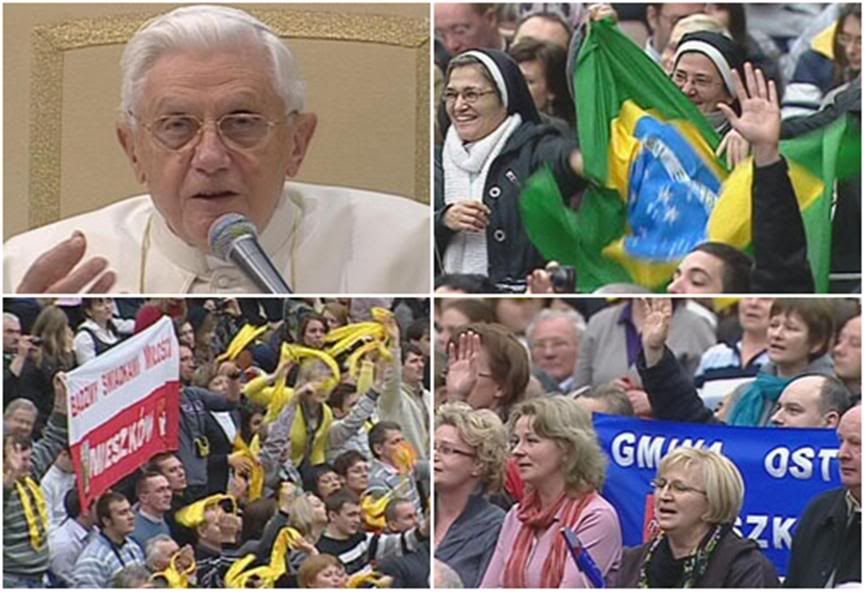 Pope remembers Holocaust victims and
Pope remembers Holocaust victims and
those who risked their lives to defend Jews
Adapted from

VATICAN CITY, Jan. 27 (AsiaNews) - In his General Audience today, Benedict XVI discussed St. Francis of Assisi as an icon of Christ and a model of dialogue with Muslims, who acted in union with the Church.
After the catechesis, he spoke about Holocaust Memorial Day, marked in Europe in the past 10 years on January 27, anniversary of the liberation of Auschwitz camp by Allied forces in 1945.
The Pope said: "We remember the horror of crimes of unprecedented cruelty, committed in the extermination camps established by Nazi Germany," especially the planned annihilation of the Jews, "and also how man" risked their lives, to protect the persecuted, opposing the murderous folly."
Benedict XVI said he prays that "the memory of these facts, particularly the tragedy of the Holocaust that affected the Jewish people, will inspire an increasingly convinced respect for the dignity of every person, that all men perceive themselves to be one great family. Almighty God enlighten hearts and minds, so that such tragedies never happen again" ....
[The rest of the AsiaNews story quotes chunks of the catechesis, so I have omitted it since I have a full translation of the catechesis itself above.]
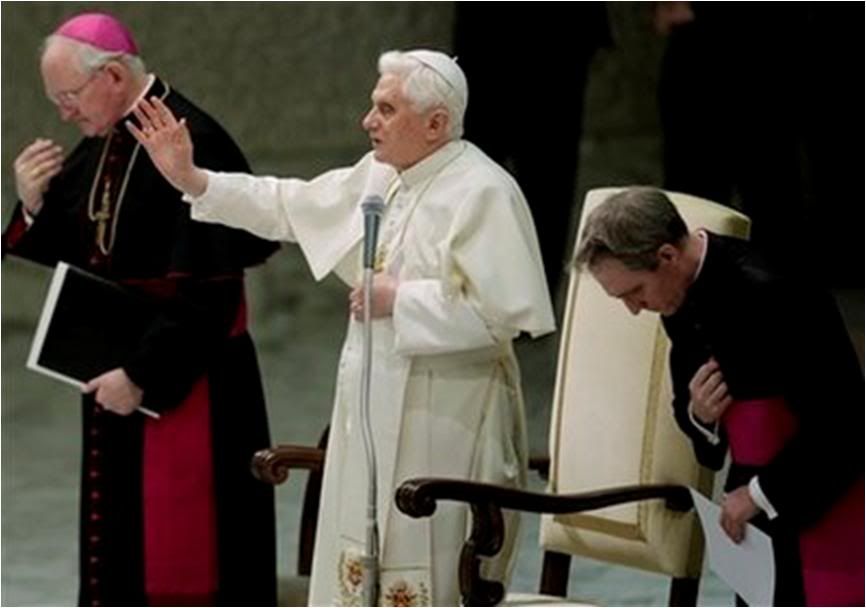 Pope blesses boy with
Pope blesses boy with
muscular dystrophy
Translated from

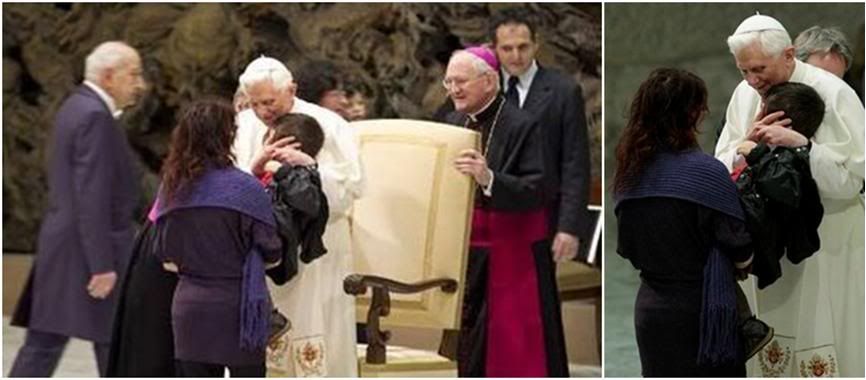
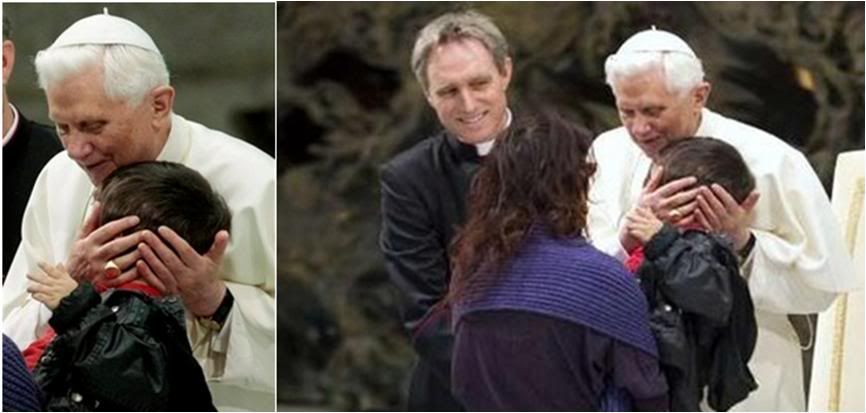
In one of the sidelights after the General Audience today, Pope Benedict blessed three-year-old Danlele Amanti, who has muscular dystrophy and is the subject of the book Daniele. Storia di un bambino che spera (Daniel: The story of a boy who hopes), written by Cinzia Lacalamita and published byAliberti.
The boy came with his parents and two Italian actors who appear in a campaign against muscular dystrophy, or Duchesne's disease, which afflicts 50,000 young people in Italy, affecting one male out of every 3500. (Women are carriers of the defective gene which causes the disease).
The initiative was born on Facebook, where Daniele's parents, Fabio and Eliana, after recounting the story of their child, have gained solidarity from thousands of 'friends', among whom they can now count the Holy Father.
 I believe there is enough material now for a volume on Benedict XVI's discourses about St. Francis. The nucleus would be this catechesis and the marvelous discourses he delivered on his visit to Assisi in 2007.
I believe there is enough material now for a volume on Benedict XVI's discourses about St. Francis. The nucleus would be this catechesis and the marvelous discourses he delivered on his visit to Assisi in 2007.
In recent weeks, he had two other catecheses on St. Francis - one before Christmas on how the Poverello started the beautiful tradition of recreating the Nativity scene, and the recent one on how the mendicant orders (Franciscans and Dominicans) catalyzed the renewal of the Church in the 13th century.
Then there was his address to the Franciscans on the 800th anniversary of the order. I also recall some Angelus mini-homilies on the saint of Assisi, and a couple of those Q&A with priests and seminarians in which he spoke about St. Francis.
Not to forget that in JESUS OF NAZARETH, Vol. I, he devotes two pages in the chapter on the Sermon on the Mount to St. Francis as 'the most intensely lived illustration of the first Beatitude', as he recalls in today's catechesis.

[Modificato da TERESA BENEDETTA 18/02/2010 09:44] |
| |
 27/01/2010 15:10 27/01/2010 15:10 |
|
| | | OFFLINE | | Post: 19.357
Post: 1.999 | Registrato il: 28/08/2005
Registrato il: 20/01/2009 | Administratore | Utente Veteran | |
|

 This is a belated post, but the author priest takes the sensible general approach to a major, generally 'multi-themed' address by the Holy Father - such as that to the diplomatic world earlier this month - by following his flow of thought, how his ideas follow a linear process that ties up all the themes he touches upon.
This is a belated post, but the author priest takes the sensible general approach to a major, generally 'multi-themed' address by the Holy Father - such as that to the diplomatic world earlier this month - by following his flow of thought, how his ideas follow a linear process that ties up all the themes he touches upon.
It is also a very good reading in the light of the Holy Father's catechesis on Francis of Assisi today, in which he restates many of the themes he dwelt on in the speech to the diplomats.
The world according to Benedict XVI
By Bevil Bramwell, OMI

Thursday, 21 January 2010
On January 11, Pope Benedict XVI met with the diplomats accredited to the Holy See for his traditional New Year’s greeting.
In the Vatican’s grand Sala Regia, under frescoes depicting great moments in Church history, the Pope spoke about the world from his point of view – as a spiritual leader. Most of the reporting, predictably, treated him as if he were a politician announcing various public policies.
But Catholics – and non-Catholics who really want to hear what the Pope has to say – should approach him in a very different way. When you do, some surprising things jump immediately into high relief.
For instance, Benedict started within the context of Christmas, when Jesus Christ “[came] to lift up all things to himself, to restore unity to creation” (Preface of Christmas II). This is a large vision: the unity with which Christ and Benedict are concerned (and hope to advance towards) will be between man and nature!
The Pope then moved on to the Church: “The Church is open to everyone because, in God, she lives for others!”
The Church can then uniquely see the different dimensions of the economic recession. It was caused by a “self-centered and materialistic way of thinking which fails to acknowledge the limitations inherent in every creature.”
The root-cause of the recession links directly to the cause of the tragedies under Communist governments that dominated so much of Asia and left so much wreckage in their wake.
Not only did they wreck many lives, but also destroyed natural resources. Like those who caused the recession, the Communist governments lost touch with the integrity of man and nature.
Here is the foundation for a theological view of the world: the supreme value is the human being in his worldly context. Ecological concerns and monetary acquisition cannot be separated from a profound respect for the dignity of man.
The Holy Father summed up Thomas Aquinas’ teaching as: “Man represents all that is most noble in the universe (cf. Summa Theologiae, I, q. 29, a. 3).”
This truth gets lost either in the obsession with ecology at the expense of man or in grabbing natural resources instead of developing “forms of agricultural and industrial production capable of respecting creation and satisfying the primary needs of all” (Message for the 2010 World Day of Peace, No. 10).
Here, too, lie the roots of peace. The just approach to resources and to human values grounds true peace. But there are a thousand reasons why people miss the chance for peace.
In Benedict’s words: “Together with the inability of the parties directly involved to step back from the spiral of violence and pain spawned by these conflicts, there is the apparent powerlessness of other countries and the international organizations to restore peace, to say nothing of the indifference, amounting practically to resignation, of public opinion worldwide.”
The Pope then drew the threads of his thought together under the rubric of the “moral order.” This is the nub of his teaching.
Political relationships necessarily exist within a substantial moral matrix that has important consequences. Allied to the truth of the moral order is the obligation to educate people in truth: “The community of believers can and wants to take part in this, but, for it to do so, its public role must be recognized.”
The Church must be free to function so that she can serve humanity. In many parts of the world today, of course, that freedom does not exist.
You will notice that he is describing a valid kind of secularity, “a positive and open secularity” in which the temporal order and the spiritual order each have a certain kind of autonomy even as they are interrelated.
[Note as well that this secularity is almost the polar opposite of “secularism,” an anti-religious ideological stance quite common in the developed world.)
Benedict’s strategy has been to unpack this concept of the properly secular through a reflection on the environment and its relation to man. He commended the 2007 Lisbon Treaty for recognizing some of these values.
Ever concerned about Europe, however, he added: “I express my hope that in building its future, Europe will always draw upon the wellsprings of its Christian identity.”
This was also the main theme of his famous speech in Subiaco, shortly before he was elected Pope (April 1, 2005): a proper understanding of secularity needs the Christian insight about man and nature.
That is why he returned to the environment and man’s relation to it. A genuine reflection on the environment always leads back to basic principles about man: “One such attack [on man] comes from laws or proposals which, in the name of fighting discrimination, strike at the biological basis of the difference between the sexes.”
Natural disasters too point us to the human sphere of international solidarity between nations. He referred to the response to the terrible earthquake in the Abruzzi region of Italy, and to the treaty between Croatia and Slovenia on common borders.
Naturally, he did not fail to make a plea, too, for peace between Israelis and Palestinians and protection for religious communities to practice their faith.
But culture and environment are not to be left out. The long troubled history of Jerusalem was telescoped into a plea “for the protection of the identity and sacred character of Jerusalem, and of its cultural and religious heritage, which is of universal value.”
Cultural environment (not just the physical) and man are the two poles of Benedict’s anthropology.
So he prayed in conclusion: “May the light and strength of Jesus help us to respect human ecology, in the knowledge that natural ecology will likewise benefit, since the book of nature is one and indivisible.”
Diplomats of the world, take heed!
Bevil Bramwell, priest of the Oblates of Mary Immaculate, teaches theology at Catholic Distance University. He holds a Ph.D from Boston College and works in the area of ecclesiology.
[Modificato da TERESA BENEDETTA 27/01/2010 18:48] |
| |
 28/01/2010 02:36 28/01/2010 02:36 |
|
| | | OFFLINE | | Post: 19.358
Post: 2.000 | Registrato il: 28/08/2005
Registrato il: 20/01/2009 | Administratore | Utente Veteran | |
|
 What a theologian Pope
What a theologian Pope
tells his fellow theologians:
Interview with Mons. Bruno Forte
by Mirko Testa
 It is unfortunate that Mons. Forte chooses to sprinkle his answers with Latin phrases, but not always explaining them....And by the way, here we see how radically different Joseph Ratzinger sounds as a theologian - he is never pompous, nor does he talk down to his audience, as perhaps Mons. Forte does too easily, but without JR/B16's wonderful gift of clarity...
It is unfortunate that Mons. Forte chooses to sprinkle his answers with Latin phrases, but not always explaining them....And by the way, here we see how radically different Joseph Ratzinger sounds as a theologian - he is never pompous, nor does he talk down to his audience, as perhaps Mons. Forte does too easily, but without JR/B16's wonderful gift of clarity...
I took the liberty of cleaning up the awkward English translation provided from the Italian, to make it read easier, but there are certain sentences that defeat me. It's the kind of dense offputting jargon that made me keep theology and all theologians at a long arm's length until after April 19, 2005, when one theologian began showing me that it could be as fascinating as being introduced to the world of philosophy in my teens through the eyes of Will Durant.
My other 'criticism' of this interview is that it ends up being much more a display of Mons. Forte's academic preparation than it is about Joseph Ratzinger's theology, as the title bills it to be. As it is, this is probably the wrong thread for this post..
ROME, JAN. 25, 2010 (Zenit.org).- Benedict XVI exhorts theologians to adopt an attitude of listening, replacing the temptation to consider themselves great with the virtue of humility
This exhortation, according to Archbishop Bruno Forte of Chieti-Vasto, president of the Italian bishops' Commission for the Doctrine of the Faith, Proclamation and Catechesis, is a safeguard against the "only authentically Christian heresy."
ZENIT spoke with Archbishop Forte about a selection of Benedict XVI's recent comments on theology. The archbishop notes how the roots of Joseph Ratzinger's thinking are revealed in his exhortations as Pope.
ZENIT: Last year, in his homily at a Mass celebrated with members of the International Theological Commission, the Pope explained that a true theologian is not one who attempts to measure the mystery of God with his own intelligence, but one who is conscious of his own limitations. On that occasion the Pope indicated humility as the way to arrive at truth, expressing a word of caution about expert theologians who behave like the ancient scribes. Do you think the Pope is referring to a marked tendency in our days?
Archbishop Forte: I believe this is an essential point that distinguishes Christian theology from any form of gnosis. The essential difference is that in theology everything stems from hearing, hence, from auditus Verbi, whereas in gnosis everything is the intellectual self-production of the individual.
This is the real reason why the only authentically Christian heresy is gnosis: the pretense to self-redemption by man who does not need the intervention of the Other, from on High, that is, the intervention of God.
A theology that is based, by its nature, on Revelation, cannot but be listening, first of all, hence humilitas: an attitude of profound willingness and obedience before God's action, who enters history in a surprising way and at the same time confirms it in its dignity, opening it to the novum adveniens of his promise.
It is a topic that Ratzinger, as theologian, has stressed repeatedly, and which comes from his knowledge of Augustine, who is the genius of the intellectus fidei lived in listening, in the use of intelligence at the service of Franciscan listening that predominates in Joseph Ratzinger's theological formation, and reappears in his teaching as Pope reappears in his intense call to humilitas and to auditus.
I would add that this topic is very important today in a society that has known the inebriation of reason and, hence, the gnostic temptation in the different faces of modern ideology. Today, in the uneasiness of post-modernity, if society does not open itself to listening and to humilitas, it runs the risk of falling into nihilism - meaninglessness....
In September of 2007, visiting the Cistercian abbey of Heiligenkreuz, the Pope criticized a certain "theology that no longer breathes in the realm of faith," and emphasized instead, "kneeling theology," a beautiful expression coined by Hans Urs von Balthasar.
Likewise, in presenting the figure of St. Bernard of Clairvaux to a General Audience, Benedict XVI said that without faith and prayer, reason on its own cannot find God, and theology becomes a vain intellectual exercise. Is this a scene present in the realm of today's theology?
The first decisive element is that, precisely because it is born from listening to the Word of God, theology needs not only a radical humilitas, but also a form of loving, hence prayerful acceptance of that Word.
Von Balthasar insisted very much on this aspect, maintaining that sanctity is not something superfluous to the theologian's work, but an essential condition. It is no accident that very great theologians, especially the Fathers of the Church, were also saints.
Hence the need to kneel before the mystery and to listen, to live the auditus not only with humility. but with the loving and persevering acceptance of worshipping faith which is inherent to the identity of Christian theology.
And also, in Joseph Ratzinger's thought, there is not only continuity with Augustine's and Bonaventure's line, but, also, a very important intuition taken up by Vatican II, namely, that there is a relation between Christian living, Christian thought and the liturgy.
The liturgy is at once culmen and fons [summit and source], as Vatican II says - that from which everything stems and to which everything in Christian existence tends, both in its living as well as in its reflective dimension.
Because of this, a theology without a liturgical soul, that is, without the capacity to praise and invoke God, is a vain intellectual exercise. It is another form of that gnosis that runs the risk of contaminating man's capacity to open himself to God.
In the great Christian-Catholic theological vision, man has been made capax Dei [ capable of God]: but this capacity is conditioned on one hand by humilitas and on the other, by the capacity of invoking the gift of God and of allowing oneself to be permeated by him, so that he has a doxological and liturgical attitude, that is, glorifying God, which is also the willingness to be molded by his action in our life. When all this is put into words, theology is really born.
And here is another consideration on the relation between theology and spirituality. We have lived through a crisis of this relationship in modern theology - the theology influenced by the opposition between Vernunftswahrheit and Geschichtswahrheit, the truth of reason and the truth of fact.
In the Enlightenment's conception only the truth of reason is truth, because it presents an absoluteness and universality that the truths of fact don't have.
Christianity, on the contrary, is based on a truth of fact, which is God's historical revelation. But to the theology of an enlightened-liberal hue, pure theological exercises could not be reconciled with spirituality which, they felt, was best left to devotional practices.
This abyss between theology and spirituality has caused great harm in the era of modern theology - especially evident in liberal theology and in some forms of Catholic modernism. It continues to cause harm where, for example, in the 1960s and 1970s, some forms of Christian theology allowed themselves to be conditioned by modern ideology, including revolutionary ideology. [Why not name it outright - liberation theology based on Marxism?]
Today we feel, instead, that we must return to the original founding statute of theological endeavor, which is to to take to thought the experience of the Mystery that is proclaimed, and therefore heard and celebrated in the liturgy, lived and witnessed in faith and charity. {I'm sorry - This is a typical sentence that I cannot clean up, without recasting it completely, so I an leaving it as is.]
Therefore, theology is not only docta fides [wise faith], that is, a fides quaerens intellectum [faith seeking understanding], but also docta caritas [wise charity], that is, to take the Word to the living of love, the gift of the love of God which is given us in the liturgy and in the grace of the sacraments, but which must then be witnessed in living, in gestures of charity that have their own silent eloquence..
A theology without spirituality risks being empty, a spirituality without theology risks being blind - to paraphrase Kant's well-known saying on intuitions and concepts.
Part 2 of the interview follows:
The Magisterium of the Church is not repressive, but progressive. Far from restricting research, it keeps it from regressing and falling into old errors, says Mons. Forte.
The Holy See's adherence to the "Bologna Process" has led to a global re-ordering of theological formation in Italy, geared to revising the existing curriculum standards in light of those required by the accord. [The Bologna process has nothing to with sausage-making! It refers to making academic degree standards and quality assurance standards more comparable and compatible throughout Europe under an agreement reached by education ministers from 27 European countries who met in Bologna in 1999.] In your opinion, does not the fact of having to conform to the precise characteristics of what is defined as 'science' in the Agreement lead to setting aside a presumption of faith in theological study?
This is an old question which has always recurred in the history of theology. I would like to give two answers: one of a historical character and one of a current character, but also methodological.
The first answer is the one St. Thomas gives the same question when he begins the Summa Teologica an unthinkable. He asks himself: utrum praeter philosophicas disciplinas aliam doctrinam haberi? That is, he asks not if the philosophical disciplines are legitimate but if theology is legitimate, with an absolutely modern approach that seems to claim the autonomy of reason. His answer is that the rationality required by scientific disciplines is above all in the scire per causas, knowing through the connections between premises and deductions.
However, this scire per causas, can be exercised in two ways: beginning from the first internal principles of science, the so-called sub-alternating sciences (he speaks, for example, of mathematics, whose most intrinsic principles cannot be demonstrated, and whose consequences can only be deduced). [In this academic distinction, sub-alternating sciences are superior in that they demonstrate the reasons for things; whereas the sub-alternate sciences demonstrate the fact of things.]
On the other hand, the sub-alternate sciences use the principles that the other sciences offer them. To this end, Thomas gives as an intriguing example in music, which depends on mathematics, in its harmonies and its relations of proportion.
Similarly, Thomas says, theology depends on scientia Dei et beatorum, that is, on Revelation. In other words, the source of theological knowledge by its nature is lumen fidei, but for its argumentation, it uses the same epistemological [relating to the study of knowledge itself] statutes as the other sciences. Hence, it has the full dignity of universitas scientiarum.
How will we respond today to the developments of theology, but also of modern epistemology? I would answer by referring to the great 20th century philosophical and theological 'conquest', namely, the powerful rediscovery of hermeneutics, that is, of the science of interpretation.
Many years ago, as dean of the faculty of theology in Naples, I invited Hans Georg Gadamer, the father of contemporary hermeneutics, author of Truth and Method, to a quaestio quodlibetalis. A first year student asked him this question: "What is hermeneutics?"
To which Gadamer, without being ruffled, said, after a moment of reflection: "Hermeneutics means that when you and I speak we make an effort to reach the vital world that is behind the other's words, and from which they proceed."
Therefore, epistemology illumined by hermeneutics means not only to understand what is immediately perceptible, the visible, the phenomenalistic, the rational, but to also understand, or at least to try to reach, those vital worlds from which these expressions come.
In this context, one discovers that science is not only the sciences of phenomena, but that there is an ensemble of sciences, which are sciences of the spirit, which make an effort to reach what is not said, what cannot be said, what cannot be wholly divided into parts, but which is the vital world in which human processes, historical processes, etc. are situated.
And there is a further level that points to that experience of the mystery of life and of the world and that all of us have and which cannot be referred to a mere linguistic or rational formula, that is, an excess of the Mystery that surrounds the world, that surrounds the life of each one of us and that we continually perceive with surprise, with wonder, which we can reflect in words only up to a certain point. [Another paragraph that defeats my best intentions.]
However, a science that takes wonder in the face of Mystery seriously, the possibility of Revelation, and make this the subject of study, becomes absolutely precious. In a hermeneutical perspective - the interpretation of reality which does not stop at the immediate but always seeks the ultimate connections -- it seems to me that theology has the full dignity of a science for man who needs God and a meaning to life.
In 1986, speaking in Brescia at a meeting organized by the Italian editorial board of Communio magazine, Cardinal Ratzinger affirmed that it was widely held in Catholic theology that the authority of the Church is foreign to science, something that limits study, or worse, deny it. In your opinion, especially after what has happened with liberation theology, is that still the perception?
The Magisterium in the Church is not regressive - it is almost a task of exploration. In a famous essay of 1953, which became a historical highlight of theological debate, Karl Rahner, wondering about the Council of Chalcedon and its dogmatic definition of Christ as a divine person with two natures, human and divine (which continues to be binding for every Christian, regardless of his confessional membership) asked himself: "Chalkedon - Ende oder Anfang?" (Chalcedon, End or Beginning?)
His answer was very clear: Dogma is not an end, it does not stop thought, it does not paralyze it, but establishes milestones in regard to which there is no going back, because to want to go back would mean[ in the case if Christ's dual nature] to fall, on the one hand, into forms of Arianism, seeing Christ only as human, and not the Savior; and and on the other, into a form of modalism, that he is a God who appeared among men but who did not truly assume our mortal flesh, who has not truly committed himself to the human.
Karl Rahner rightly said that Chalcedon's dogmatic definition was a bulwark against regression, not against progress. Hilary of Poitiers, in turn, expressed a most beautiful dimension of this exercise of magisterial discernment by the Church.
He said: Dogma is an exigency of charity, an aid to not lose the way that God has indicated to us. EVen in this casem the vision was clearly not defensive or repressive but prospective.
The case of liberation theology that you mentioned seems to me an eloquent example, because the Congregation for the Doctrine of the Faith had two interventions in this regard: one eminently critical, which illumined the limits often connected with the ideological dependence of this theology; the other brought to light its good ideas, the positive contributions of a theology inspired by the primacy of charity and service.
I believe that in that case, the Magisterium fulfilled exactly what Hilary of Poitiers meant, affired more recently by Karl Rahner, by which dogma is not a repressive action to extinguish life, but to protect and promote that authentic life that only the truth of God allows.
I would summarize with verse 8:32 of John, which John Paul II liked to repeat and which he also repeated to us in the International Theological Commission, when it was working on the document "Memory and Reconciliation" to support seeking forgiveness for the faults of the Church through history: "The truth will make you free."
Therefore, the more the cause of truth is served, the more the Magisterium is placed at the service of the truth, the more it can foster freedom, the genuine lfreedom iberty that gives meaning, fullness and life to man's heart.
I have my reservations about Mons. Forte, because although he had been touted often as a 'Ratzingerian' (even if he had studied witn Cardinal Carlo Maria Martini), reports at the time - which he never denied, and he is one of the Italian bishops who have the easiest access to the media -
[See accounts in the PRF:
freeforumzone.leonardo.it/discussione.aspx?idd=354494&p=129]
said he was one of the bishops who opposed Summoruum Pontificum at the first CEI Permanent Council meeting after its enforcement in September 2007 - on the theoretical grounds that the ecclesiology of the traditional Mass was supposedly incompatible with Vatican II .
The opponents of SP wanted the CEI to draw up an explanatory note of a restrictive nature for Italian dioceses, but they were voted down because, the majority of the 30-member Permanent Council pointed out, the Holy Father's own letter accompanying the Motu Proprio did not require further interpretation. Remembering that episode, I bristled upon reading Mons. Forte's comments bringing up the liturgy above!
[Modificato da TERESA BENEDETTA 28/01/2010 10:53] |
| |
 28/01/2010 10:50 28/01/2010 10:50 |
|
| | | OFFLINE | | Post: 19.359
Post: 2.001 | Registrato il: 28/08/2005
Registrato il: 20/01/2009 | Administratore | Utente Veteran | |
|

 Church and State in the writings
Church and State in the writings
of the young Joseph Ratzinger
Following Augustine, 'we must avoid the ecclesialization of the Church
as well as the statalization of the Church'
by Cesare Cavalleri
Translated from

January 27, 2010
In 1962, the 35-year-old Professor Joseph Ratzinger gave a lecture at the Salzburger Hochshule on the relationship between the element of nation, and the human and universal, in the eyes of the Fathers of the Church, specifically Origen and Augustine.
The text, first published in journals, was issued as a book in 1970, translated to Italian by Morcelliana [publishers] in 1973, and now deservedly reissued with the same title, L'unità delle nazioni. Una visione dei Padri della Chiesa (The unity of nations: A vision of the Fathers of the Church) (144 pp, euro 12.00).
The editor of L'Osservatore Romano writes in the Introduction to the new edition: "All of Ratzinger is already in this little book, so much more valuable though it is little known".
In these pages, indeed, there is the Biblicist Ratzinger who follows the canonical interpretation of Scripture, and therefore, analyzes individual passages within Church canon,
There is Ratzinger the theologian who never loses sight of the ultimate significance of historical events.
There is the Ratzinger who was an impassioned scholar of the Fathers, and who had dedicated his doctoral thesis to St. Augustine.
And there is always Ratzinger the professor who couples expository clarity with the rigor of his methodology, and documents every statement with the sources punctiliously annotated in his footnotes.
The subject of the study, which might seem to be an erudite area of research - 'political theology' - is still of outstanding relevance.
Let us see a bit of it. At the peak of Romanity, Augustus Caesar ordered the construction of the Ara Pacis (altar of peace), with a depiction of Mother Earth as the symbol of the unity of the human race in the cosmic dimension represented by the empire.
The motto Augustei pax in terra (Augustan peace on earth) would be re-echoed with a completely different meaning by the angels in announcing the birth of the Savior to the shepherds.
In the Bible, however, the unity of the human race is shattered with the construction of the Tower of Babel, and the subsequent dispersion of mankind which continues to our day has punitive significance.
Against gnosticism which opposed every form of state organization - seen to be an expression of a radically evil world - Origen did not veer away from the Christian interpretation that the world, although corroded by sin, is nonetheless teh work of God the Creator.
And even if he considered nation States governed by archons [Greek term for absolute sovereigns] as demoniacal, Origen distinguished two laws - natural law, which is of divine origin; and the law of States which, in case of conflict, should be subordinated to natural law.
On the other hand, Augustine considered political religion as founded only on custom and habit, where the Christian religion possesses the truth that emancipates man from the power of demons.
Augustinian political theology was antithetical both to stoicism which identified God with the world, and with platonism which excluded every contact between God and the world.
By virtue of the Incarnation, God the Creator is also the God of history, in history, and Augustine could oppose to the confusion of languages in Babel the miracle of tongues at Pentecost.
The Augustinian doctrine of the two cities [city of God and city of man] "aims neither at the 'ecclesialization' of the State, nor the 'statalization' of the Church, but in the midst of worldly orders, which remain and should remain wordily orders, it aims to manifest the new power of faith in the unity of mankind in the Body of Christ, as an element of transformation, whose fulfillment would be brought about by God himself when history comes to an end", Prof. Ratzinger wrote.
Augustine thus hopes for a renewal of the Roman Empire, even as he remains faithful to eschatological thinking which relativizes every worldly order.
Even this rough synthesis conveys the thinking which the then professor would subsequently develop in later writings and in the documents he issued as Prefect of the Congregation for the Doctrine of the Faith and now, as Pope.
First, I would note that the publication of an Italian edition of an academic lecture by a relatively obscure German professor in 1973 is quite extraordinary - and a tribute to the intellectual outlook of Italian publishers and the readers they serve. A reissue at this time indicates that the outlook and the need it serves are very much alive in Italy today, where apparently, there is an ongoing sub-industry in the publishing world that is flourishing on the publication of any and all books by and about Joseph Ratzinger/Benedict XVI.
[Modificato da TERESA BENEDETTA 28/01/2010 10:50] |
| |
 28/01/2010 11:46 28/01/2010 11:46 |
|
| | | OFFLINE | | Post: 19.361
Post: 2.003 | Registrato il: 28/08/2005
Registrato il: 20/01/2009 | Administratore | Utente Veteran | |
|


 Serbian Patriarch wants
Serbian Patriarch wants
to meet Benedict XVI

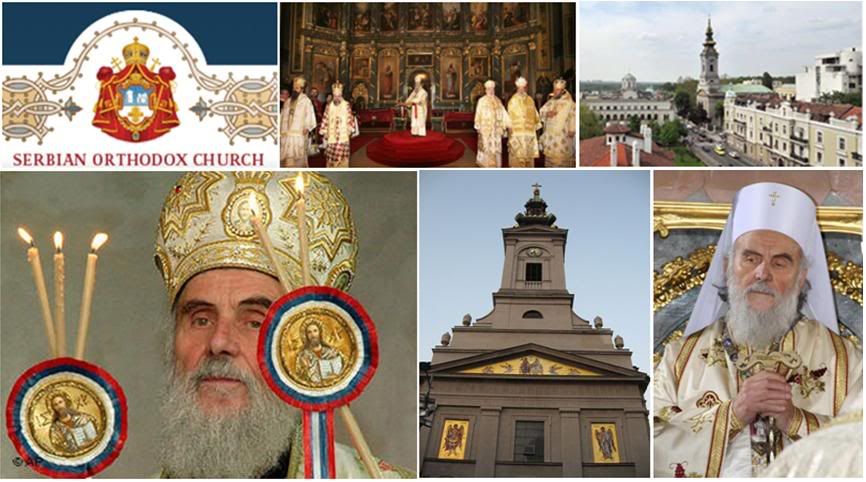
BELGRADE, Jan. 27 (Translated from ANSA's Balkan service) - Irinej, the new Patriarch of the Serbian Orthodox Church, has reiterated his desire to meet Pope Benedict XVI, saying "the time has come for such a meeting" which could take place in Serbia.
"In the past, a possible visit by the Bishop of Rome had been discussed, but our position at the time was that the time had not come and we should await the right occasion. Now, I think the time has come," the Patriarch was quoted in the Belgrade newspapers.
"Perhaps it is time that we should tell each other directly what we have to say, and then we can both reflect. Divisions are never positive," he said. "And the division between the Eastern and Western Churches has lasted for centuries".
Thus, he said, a meeting would be indispensable to start examining the outstanding issues. "It is not possible to get to know each other without meeting and talking to each other."
In the days before his election earlier this week to replace Patriarch Pavle, who died last November at age 95, Irinej had said the Serbian Church would like to invite Benedict XVI to visit in 2013 on the 1700th anniversary of the Edict of Milan whereby Emperor Constantine officially recognized Christianity.
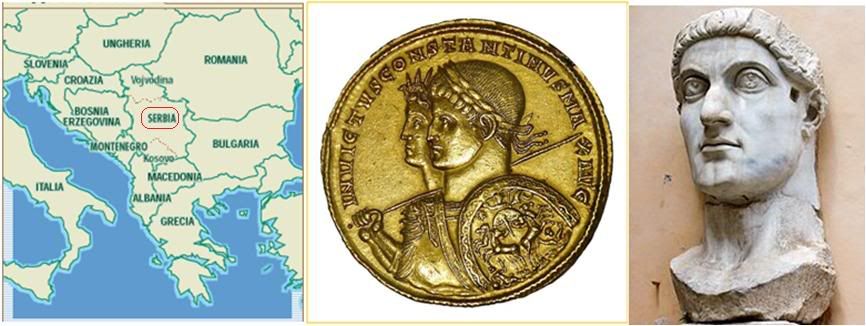 Constantine the Great (272-337) was Roman Emperor from 306 to his death. Center photo, imperial coin from 313; right, head of the so-called Constantine Colossus, a 12-meter high statue of the emperor during his lifetime, now in Rome's Museo Capitolino.
Constantine the Great (272-337) was Roman Emperor from 306 to his death. Center photo, imperial coin from 313; right, head of the so-called Constantine Colossus, a 12-meter high statue of the emperor during his lifetime, now in Rome's Museo Capitolino.
Serbia is celebrating this particularly in Nis, a city of south Serbia where Constantine was born to a Roman soldier and his wife.
Irinej was Bishop of Nis until he was elected Patriarch.
Fr. Lombardi says Patriarch's
words are 'very encouraging'

VATICAN CITY, Jan. 28 (Translated from Apcom) - Statements made by the new Patriarch of the Serbian Orthodox Church are 'very encouraging', according to Vatican spokesman Fr. Federico Lombardi, who said, however that it is premature to speculate on a papal visit to Serbia in 2013 as Patriarch Irinej hopes for.
"His words do show that we are on the right path and that we will continue to follow this road to Christian unity," Lombardi said.
As for a papal visit to Serbia, Lombardi noted that "We know 2013 represents an important date for the Serbian Church, and it is something that the Vatican will keep in mind."
He also pointed out that Serbian President Boris Tadic extended the invitation to the Pope when he visited the Vatican last November 4.
Fr. Lombardi said in a Vatican note that "In the context of positive dialog with the Orthodox Churches, the Holy See has taken note of the plans by the Serbian Catholic Church to celebrate the 1700th anniversary in 2013 of the Edict of Milan by Emperor Constantine who was born in Nis [now part of Serbia]."
The Vatican last week released the text of Pope Benedict's letter to Patriarch Irinej congratulating him on his election.
[Modificato da TERESA BENEDETTA 28/01/2010 18:29] |
| |
 28/01/2010 14:16 28/01/2010 14:16 |
|
| | | OFFLINE | | Post: 19.362
Post: 2.004 | Registrato il: 28/08/2005
Registrato il: 20/01/2009 | Administratore | Utente Veteran | |
|
 Thursday, January 28
Thursday, January 28
 Second from left, detail from Gozzoli's Triumph of St. Thomas,1471; and second from right, St. Thomas from a fresco by Fra Angelico, ca 1435.
ST. THOMAS AQUINAS (Tomasso d'Aquino] (Italy, 1225-1274)
Second from left, detail from Gozzoli's Triumph of St. Thomas,1471; and second from right, St. Thomas from a fresco by Fra Angelico, ca 1435.
ST. THOMAS AQUINAS (Tomasso d'Aquino] (Italy, 1225-1274)
Dominican , Philosopher-Theologian, Doctor of the Church (Doctor Angelicus)
Born the son of a count in a castle that still stands not far from Rome, Thomas was sent to the Benedictines at Monte Cassino at age 5. His parents expected him to grow up to become its abbot like his paternal uncle. But at 18, when studying in Naples, he was attracted to the Dominican Order. Two years followed during which his family 'imprisoned' him in the hope of dissuading him from joining the Dominicans. But eventually his mother helped him escape in a face-saving gesture, and he went on to Paris for further studies. Albertus Magnus was one of his teachers, and when he was sent to Germany, Thomas followed him to Cologne. In 1252, he returned to Paris where he was named master of theology at the university. In 1259, his order recalled him to Naples to set up a school, then went on to Rome in 1965 for the same purpose, at which time he began work on his masterpiece, the Summa Theologica. He returned to Paris in 1268-1272 for a second turn as master of theology at the university, after which he returned to Naples. During all this time, he wrote volume upon volume of what are considered to be the bedrock texts of scholastic theology. En route to the Second Council of Lyons in 1274, he struck his head on a tree and never fully recovered. A year before he died, he decided to stop writing, saying famously that "all I have written seems like so much straw compared to what has been revealed to me". He is a towering figure in the history of Western thought. Compared to what has been written about him as a thinker, not much is generally written about his spiritual life, but in many medieval images, he was portrayed as a mystic.
Readings for today's Mass: www.usccb.org/nab/readings/012810.shtml
OR today.
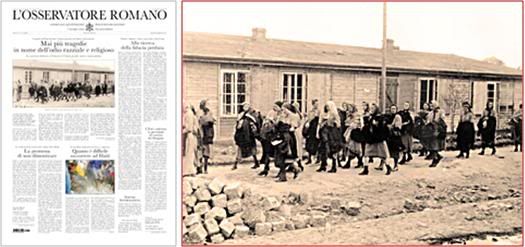
Benedict XVI's appeal at the General Audience on Holocaust Memorial Day:
'No more tragedies in the name of racial and religious hatred!'
His catechesis was devoted to Francis of Assisi - 'a great saint and joyous man'.
Other Page 1 stories: An editorial on the promise never to forget the Holocaust as the culmination
of man's evil; the 40th World Economic Forum in Davos takes place without government
representatives from the USA and China, as other governments and the private sector seek to
recover mutual trust; the IMF (International Monetary Fund) confirms China's projected growth
rate in 2010; and continuing frustration at the extreme difficulty of administering aid to Haiti's
earthquake victims. In the inside pages, two excellent articles on St. Thomas Aquinas, and
a review of the RAI TV movie on St. Augustine previewed a few months back by Benedict XVI.
THE POPE'S DAY
The Holy Father met today with
- Bishops of England and Wales (Group 2) on ad limina visit
- Members of the various Pontifical Academies. Address in Italian.

Benedict XVI has had only one occasion to speak about St. Thomas Aquinas so far. Here is part of what he said in an Angelus mini-homily on January 28, 2007:
With his charism as a philosopher and theologian, St. Thomas offered an effective model of harmony between reason and faith, dimensions of the human spirit that are completely fulfilled in the encounter and dialogue with one another.
According to St Thomas's thought, human reason, as it were, "breathes": it moves within a vast open horizon in which it can express the best of itself. When, instead, man reduces himself to thinking only of material objects or those that can be proven, he closes himself to the great questions about life, himself and God and is impoverished.
The relationship between faith and reason is a serious challenge to the currently dominant culture in the Western world...Human reason loses nothing by opening itself to the content of faith, which, indeed, requires its free and conscious adherence.
St Thomas Aquinas, with farsighted wisdom, succeeded in establishing a fruitful confrontation with the Arab and Hebrew thought of his time, to the point that he was considered an ever up-to-date teacher of dialogue with other cultures and religions. He knew how to present that wonderful Christian synthesis of reason and faith which today too, for the Western civilization, is a precious patrimony to draw from for an effective dialogue with the great cultural and religious traditions of the East and South of the world.
This became the basis for an excellent essay by Fr. James Schall.
Going by chronology, the Holy Father will be getting around soon to discussing Aquinas at his weekly catecheses.
[Modificato da TERESA BENEDETTA 28/01/2010 21:20] |
| |
 28/01/2010 17:07 28/01/2010 17:07 |
|
| | | OFFLINE | | Post: 19.364
Post: 2.006 | Registrato il: 28/08/2005
Registrato il: 20/01/2009 | Administratore | Utente Veteran | |
|

 Pope encourages Pontifical Academies
Pope encourages Pontifical Academies
to promote 'authentic Christian humanism'
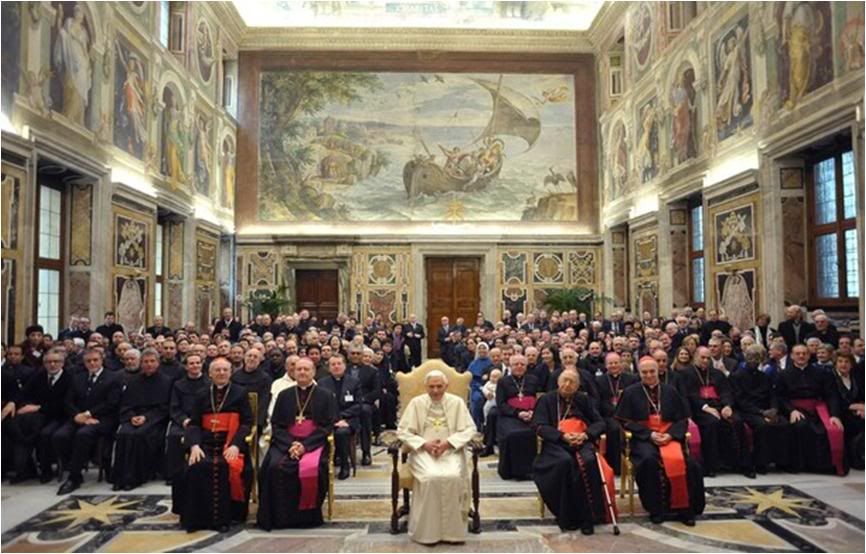
This morning, on the Feast of St. Thomas Aquinas, Benedict XVI received some 300 participants in the annual public session of the pontifical academies.
The event was attended by representatives from the following institutions: the Academy of St. Thomas Aquinas, the Theological Academy, the Academy of Mary Immaculate, the International Marian Academy, the Academy of Fine Arts and Literature "dei Virtuosi al Pantheon", the Roman Academy of Archaeology and the "Cultorum Martyrum" Academy.
Here is a full translation of the Holy Father's address to them:
Dear Cardinals,
Venerated Brothers in the Episcopate and the Priesthood,
Distinguished Presidents and Academicians,
Ladies and Gentlemen:
I am happy to welcome you and meet with you, on the occasion of the Public Session of the Pontifical Academies, the culminating moment of the year's multiple activities.
I greet Mons. Gianfranco Ravasi, president of the Coordinating Council of the Pontifical Academies, and I thank him for the kind words he addressed to me.
I extend my greetings to the Presidents of the Pontifical Academies, to the academicians and to the associates present. Today's public session, during which the Prize of the Pontifical Academy was awarded in my name, was on a theme which, in the context of the Year for Priests, takes on particular significance: "The theological formation of the priest".
Today, the memorial of St. Thomas Aquinas, great Doctor of the Church, I wish to offer you some reflections on the goal and specific mission of the meritorious cultural institutions of the Holy See that you are part of, and which can claim a varied and rich tradition of research and engagement in various sectors.
The years 2009-2010, in fact, are for some of them, marked by specific anniversaries which constitute yet another reason to give thanks to the Lord.
In particular, the Pontifical Roman Academy of Archeology marks its foundation two centuries ago, in 1810, and its transformation into a Pontifical Academy in 1829.
The Pontifical Academy of St. Thomas Aquinas and the Pontifical Academy Cultorum Martyrum have marked their 130th anniversary, both having been established in 1879.
The Pontifical International Marian Academy celebrated the 50th year since it was transformed into a Pontifical Academy.
Finally, the Pontifical Academies of St. Thomas Aquinas and of Theology marked the tenth anniversary of their institutional renewal which took place in 1999 with the Motu proprio Inter munera Academiarum, which bears the date of January 28.
So many occasions, then, to revisit the past, through the attentive reading of the thoughts and actions of the Founders and all those who gave their best for the progress of these institutions.
But a retrospective look at the memory of a glorious past cannot be the only approach to these events, which recall above all the task and the responsibility of the Pontifical Academies to serve the Church and the Holy See faithfully, renewing today their rich and diversifgied commitment which has already produced so many precious results, even in the recent past.
Contemporary culture - more so, believers themselves - continually require the reflection and action of the Church in the various fields where new problems are emerging, and which constitute the very sectors in which you work, such as philosophical and theological research; reflection on the figure of the Virgin Mary; the study of history, monuments, of the testimonials we have received as a legacy from the first Christian generations, starting with the Martyrs; the delicate and important dialog between the Christian faith and artistic creativity, to which I dedicated the meeting with personalities from the world of art and culture at the Sistine Chapel last November 21.
In these sensitive areas of research and involvement, you are called to offer a contribution that is qualified, competent and impassioned, so that the whole Church, particularly the Holy See, can avail of the opportunities, languages and means adequate to dialog with contemporary culture, and respond effectively to the questions and challenges that arise in the various fields of knowledge and human experience.
As I have stated many times, today's culture strongly suffers both from a vision dominated by relativism and subjectivism, as well as from methods and attitudes that are often superficial and even banal, that damage the seriousness of research and reflection, and consequently, that of dialog, confrontation and interpersonal communications.
Therefore, it seems urgent and necessary to recreate the essential conditions for a real capacity for study and research in depth, in order that we can dialog reasonably and effectively confront each other on various problems, in the context of common growth and a formation that promotes man in his wholeness and completeness.
The lack of ideal and moral reference points, which particularly penalizes civil coexistence, and above all, the formation of the younger generations, should be met with an ideal and practical proposal of values and truth, of strong reasons for life and hope, which can and should interest everyone, especially the youth.
Such a commitment should be especially cogent in the area of forming candidates for the ordained ministry, as the Year for Priests calls for, and as confirmed by your happy choice of your annual public session for this theme.
One of the Pontifical Academies is named for St. Thomas Aquinas, the Doctor Angelicus et Communis, an always relevant model to inspire the activity and the dialog of the Pontifical Academies with different cultures.
In fact, he succeeded in establishing a fruitful confrontation with Arab as well as Jewish thinking in his time, and while treasuring the Greek philosophical tradition, he produced an extraordinary theological synthesis, fully harmonizing reason and faith.
Already with his contemporaries, he left a profound and indelible memory, by the extraordinary refinement and acuteness of his intelligence and the greatness and originality of his genius, besides the luminous sanctity of his life.
His first biographer, Guglielmo da Tocco, underscored the extraordinary and pervasive pedagogical originality of St. Thomas, with expressions that could inspire your own activities: "Fra Tomasso," he wrote, "introduced new articles into his lectures, resolved questions in a new and clearer way with new arguments. Consequently, those who heard him teach new theses, treating them with new methods, could not doubt that God had enlightened him with a new light: indeed, could one ever teach or write new opinions if one has not received new inspiration from God?" (Vita Sancti Thomae Aquinatis, in Fontes Vitae S. Thomae Aquinatis notis historicis et criticis illustrati, ed. D. Prümmer M.-H. Laurent, Tolosa, s.d., fasc. 2, p. 81).
The thought and the testimony of St. Thomas Aquinas suggests that we should study emerging problems with great attention in order to offer adequate and creative responses. Confident in the possibilities of 'human reason', in full fidelity to the immutable depositum fidei, we must - as the Doctor Communis did - always draw from the riches of Tradition, in the constant search for "the truth of things".
For this, it is necessary that the Pontifical Academies, today more than ever, be vital and lively institutions, able to acutely perceive both the questions of society and of cultures, as well as the needs and expectations of the Church, to offer an adequate and valid contribution, and thus promote, with all the energies and means at its disposal, an authentic Christian humanism.
Therefore, as I thank the Pontifical Academies for their generous dedication and profuse commitment, I wish that each may enrich their individual histories and traditions with new significant projects to carry out their respective missions with new impetus.
I assure of remembrance in my prayers, and in invoking on you and your institutions the intercession of the Mother of God, Seat of Wisdom, and of St. Thomas Aquinas, I impart the Apostolic Blessing from my heart.
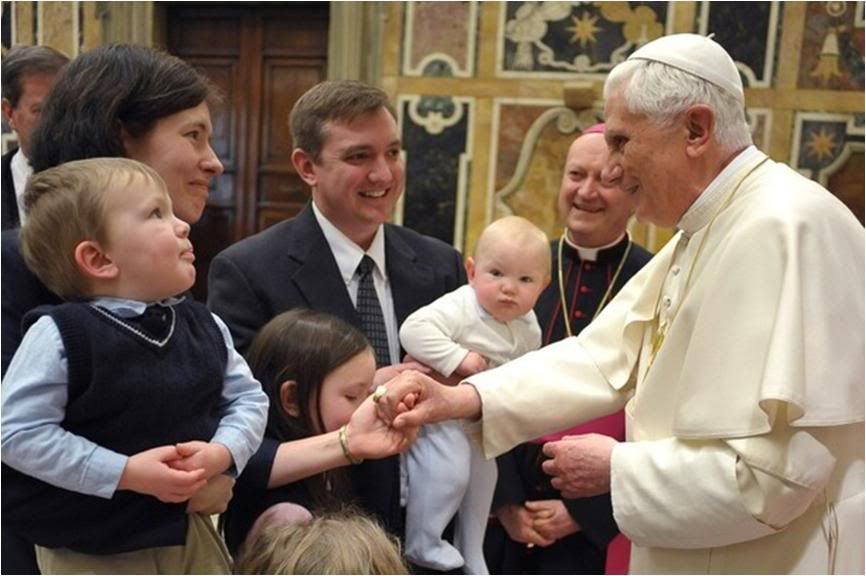 The Holy Father greets families of some of the Academicians.
The Holy Father greets families of some of the Academicians.
[DIM] A news conference was held on Tuesday to discuss the initiatives of the Pontifical Academies, and the Press Office actually had a very informative release about each of the academies but I did not have the time to translate and thought I would leave it to be a backgrounder for today's event. Here, at least, is the VIS report on that newscon.
PONTIFICAL ACADEMIES:
OPEN TO NEW KNOWLEDGE

VATICAN CITY, 26 JAN 2010 (VIS) – This morning in the Holy See Press Office a conference was held to present “Pontifical Academies for a New Christian Humanism”, an initiative that will include a special audience of the Holy Father with the pontifical academies on 28 January, and the public session of those academies on 27 January.

Participating in today’s press conference were Archbishop Gianfranco Ravasi, president of the Pontifical Council for Culture and of the Co-ordinating Council of the Pontifical Academies, and Msgr. Pasquale Iacobone , official of the same pontifical council and delegate of the co-ordinating council.
The Co-ordinating Council of the Pontifical Academies was created by John Paul II in 1995 and is made up of the presidents of the following institutions:
- the Academy of St. Thomas Aquinas
- the Theological Academy
- the Academy of Mary Immaculate
- the International Marian Academy
- the Academy of Fine Arts and Literature “dei Virtuosi al Pantheon”
- the Roman Academy of Archaeology and
- the “Cultorum Martyrum” Academy.
A joint public session of the Pontifical Academies is organised once a year to examine a theme of current importance. This year’s meeting, the fourteenth, focuses on the “theological formation of the clergy” and has been organised by the Academy of St. Thomas Aquinas and the Theological Academy.
The public session also includes the presentation of the Pontifical Academy Prize which is awarded by the Pope to institutions or to young researchers or artists who have distinguished themselves in promoting Christian humanism.
The prize-winner this year is the American theologian John Mortensen who gained his doctorate in 2006 from Rome’s Pontifical University of the Holy Cross with a thesis on “Analogy in St. Thomas”.
In his remarks Archbishop Ravasi recalled how the activity of the Pontifical Academies focuses on three fields: theology, culture and the reappraisal of Christian heritage especially from Roman times.
The president of the Pontifical Council for Culture likewise explained that one of the purposes of the session is to publicise the “often little known activity” of the academies, which he called “little worlds of very-high-quality research”.
The session will also help to ensure that the work undertaken in those academies leaves their confines and becomes more widespread, making them not just glorious vestiges of the past but institutions capable of confronting the modern world of knowledge.
In this context, he noted that the granting of this year’s prize to layman with a family is a sign of the openness of theological research which, he said, cannot be limited only to the clergy.
For his part, Msgr. Iacobone pointed out that this will be Benedict XVI’s first audience with the pontifical academies. He also recalled how the years 2009-2010 are very significant for some of these institutions, such as the Roman Academy of Archaeology which has celebrated the two hundredth anniversary of its foundation (1809), the Academy of St. Thomas Aquinas which marked its 130 years, and the International Marian Academy which was made a pontifical academy fifty years ago.
Part of the Vatican backgrounder on the Pontifical Academies also says this:
The Coordinating Council meets several times a year, presided by the head of the Pontifical Council for Culture, to hear a general report of activities by each of the academies, and to coordinate their activities in order to promote interdisciplinary research for greater resonance of these activities.
This also facilitates regular information exchange, scientific cooperation and collegial discussions.
The Coordinating Council today is composed of:
- Mons. Gianfranco Ravasi, President, Pontifical Council for Culture
- Mons. Lluís Clavell, President, Pontifical Academy of St. Thomas Aquinas
- Fr. Manlio Sodi, S.D.B., President, Pontifical Theological Academy
- Cardinal Andrzej Maria Deskur, President, Pontifical Academy of Mary Immaculate
- Fr. Vincenzo Battaglia, O.F.M., President, Pontifical International Marian Academy
- Prof. Vitaliano Tiberia, President, Pontifical Academy of Fine Arts and Letters
- Prof. Letizia Pani Ermini, President, Pontifical Roman Academy of Archeology
- Prof. Fabrizio Bisconti, Magister, Pontifical Academy «Cultorum Martyrum».
The Academies have their official headquarters in Rome at the Palazzo San Pio X on the Via della Conciliazione.
[Modificato da TERESA BENEDETTA 29/01/2010 01:12] |
| |
 28/01/2010 17:22 28/01/2010 17:22 |
|
| | | OFFLINE | | Post: 19.365
Post: 2.007 | Registrato il: 28/08/2005
Registrato il: 20/01/2009 | Administratore | Utente Veteran | |
|


 Pope will visit Edinburgh
Pope will visit Edinburgh
and Glasgow on UK trip
by Alison Campsie

January 28, 2010
The Pope is due to visit Scotland for one day as part of a four-day trip to the UK, The Herald understands.
Pope Benedict XVI is expected to attend events in both Edinburgh and Glasgow on the historic trip, during his visit to Britain between September 16 and 19.
A special celebration is to be held in honour of Pope Benedict XVI at Glasgow Green, with plans for Edinburgh yet to be announced.
The visit has come about following a personal invitation from Prime Minister Gordon Brown, with the Pope due to mark the beatification of John Henry Newman, the most celebrated Anglican convert to Roman Catholicism .
A spokesman for the Catholic Church in Glasgow said: “There has been no confirmation yet of the dates of the Papal visit. There is great expectation and excitement but we can’t make any concrete plans until the dates and details are confirmed.
“Since it will be a state visit, the local Church has less direct involvement in the planning stage. We can only really begin to put plans in place when the UK Government, Buckingham Palace and the Holy See finalise the timing.”
A spokesman for the Church in Scotland said: “It is our expectation and our hope that the Pope will come later this year but we still await official confirmation.”
Benedict’s predecessor, Pope John Paul II, made a highly successful and popular visit to Scotland in 1982 when he celebrated mass in Bellahouston Park in Glasgow.
Benedict’s visit is expected to be lower key given his age and health. He will be 84 in April. [83!]
The prospect of the visit has provoked a debate in the Catholic Church in Scotland over the way Mass is celebrated.
Pope Benedict has championed a return to the Tridentine, or Latin, Mass [Obviously he does not! He has simply allowed the traditional Mass to be celebrated as validly as it was in the past, without affecting the New Mass in any way. In fact, he himself continues to say all his public Masses in the Novus Ordo! Loose reporting like this only arouses unnecessary passions!] and supporters in Scotland believe his stance can further their cause in the face of what some believe is a reluctance to do so on the part of some bishops, who are said to favour a more informal form of worship.
Pope Benedict has been a student of the writings of Cardinal Newman since he was a young seminarian.
One week earlier, the same newspaper published a very biased (and also rather misinformed) commentary - the bias is evident from the very title - on Pope Benedict XVI's visit, published before there had been any news of a Scottish 'leg' to his four-day UK trip, other than a visit to Queen Elizabeth in Balmoral.
In addition, the entire article is colored by a glowing account of John Paul II's visit in 1982, inevitably history-making because it was the first papal visit to the United Kingdom since Henry VIII broke off from the Roman Catholic Church to set up his own Church of England.
Additionally, non-Catholics always under-estimate the unique drawing power and fascination of a Pope - any Pope, I dare say - to Catholics. If any of the Popes before Paul VI had had the benefit of air travel, they would have been welcomed anywhere they went with as much fervor.
Similarly - and without taking anything away from John Paul II's obvious 'star power', if you will - the reception for him in all the 107 countries he visited would have been no less if he had been someone as reserved as Paul VI - or as the media would say 'less charismatic' - if only because in all but a handful of those countries that had been visited by Paul VI, he was the first Pope ever to visit.
And the overwhelming reception that Benedict XVI has received in all the Christian countries he has visited so far have been no less than the reception that Catholics gave to John Paul II.
At the very least, the following commentary is premature, and will, I believe, prove to be entirely rash and dead wrong![As wrong as ]the French media were in predicting few would turn out to see Benedict XVI!
To be fair, much of the article deals with the apathy of the Socttish bishops themselves, because apparently, they are completely out of step with the Holy Father, preferring to 'homogenize' the Catholic religion with Protestant practices. I certainly hope the Scottish Catholics will prove to have more 'good faith' than their bishops do, who probably deserve more prayers even than their faithful!
Sharp contrast with the past
as Pope’s visit inspires apathy
by Rosemary Goring

January 16, 2010
What a difference a new century makes. The first and last time a Pope visited Scotland, in 1982, the build-up was tremendous, and the day itself went down as one of the defining moments of modern Scottish history.
Even die-hard Protestants were wooed by the thrill of this unprecedented visit, and watched the coverage of that day’s events with pride. In what was widely and correctly perceived as an age increasingly dominated by a secular agenda, here was Christianity taking centre stage: gloriously, joyfully, and prayerfully.
For the Catholic community in Scotland, despite the occasional and predictable outburst of anti-Catholic feeling, Pope John Paul II’s trip was an unforgettable and emotional meeting of Pontiff and people.
Few who were there will forget the touchingly personal note John Paul II struck with his Scottish flock. One suspects that the cases of heatstroke dealt with by the first aid outposts throughout Bellahouston Park might have had as much to do with the excitement of seeing the Pope in person as with the sun’s glare.
Before that visit, some were no doubt anxious that such a huge public celebration of Catholicism would inflame sectarian grudges, which are notoriously easily triggered. Yet, as the event itself demonstrated, the benefits of the day far outweighed a few complaints.
Today, however, with society more keen than ever to stamp out religious bigotry of all kinds, it is possible that a desire to keep in step with a multi-faith Scotland might lie behind the alleged apathy of Scottish Catholic bishops over Pope Benedict XVI’s visit later this year.
Already the reception for this behind-the-scenes visit has been soured by a reported lassitude on the part of the Scottish Catholic hierarchy, whose methods of liturgy and pastoral care are very different from those Pope Benedict would like to see practised.
The conceptual gulf between the Scottish Catholic Church and the Vatican that this outlook suggests is perhaps not wholly surprising. Benedict, as a retro, revivalist Pope, is keen to reintroduce a degree of formality – and Latin – to the celebration of Mass, and to dealings between priest and parish.
His ambitions are those of a first-rate intellectual who grew up well before Vatican II, and its populist-minded changes.
Before his elevation to the papacy, Joseph Ratzinger was a renowned academic, a professor of theology who had written a vast number of books. Born in Bavaria in 1927, he was the oldest papal appointment [Madame, Popes are elected, not appointed!] since the 18th-century Pope Clement XII.
Theologically conservative, he has been a staunch supporter of bringing back the Tridentine, or Latin Mass. His papacy so far has shown him as a man of strong pastoral sensibility, but he has also courted controversy. On one occasion he offended the Islamic community with what were seen as derogatory remarks about their beliefs, and the revelation that as a teenager he had been a member of the Hitler Youth alco caused concern. [Ignorance, ignorance! Not a revelation at all! It was known about him throughout his career and he wrote about it in his memoir.]
If there truly is scepticism over his reforms among the bishopry, this may stem from the inherent resistance of priests working daily in the complex and far from easy setting of modern Scotland.
While no faith wants to lose its distinctiveness, ecumenism is seen by many across the religious spectrum as the holy grail, a civilised way to ease tensions, rather than entrench them.
[But who ever said that ecumenism meant syncretism - diluting one's own faith and practice of it to accommodate to others? And why must it be the Catholics who have to adapt to others, not the others to us? No, let us keep our practices and let them keep theirs.
Summorum Pontificum keeps alive the centuries-old rite that has distinguished the Church from its Protestant offshoots, in the admirable way that the Orthodox Churches have kept their traditional rites, without any question whatsoever of wishing to replace or dilute them. Besides, this article - and the problematic Scottish bishops - completely ignore that High Anglicanism itself has been distinguished by upholding a traditional rite that is far closer to the traditional Roman rite than the Novus Ordo is.]
Given the liberal, laid-back tone of many services, the argument seems to be that the more low-key the rituals and pomp associated with the Catholic Church, the more widely the Christian message is likely to be heard and sought. [A fallacy that has been demonstrated daily since Vatican II - when Church attendance everywhere started dropping precipitously and has never quite recovered.]
In Italy, or indeed any predominantly Catholic country, a shift towards greater ceremony is more easily accepted, one presumes, than in countries on the margins of the faith, where the Church is under perpetual, corrosive assault from apathy or disbelief.
To be told what’s best for their parishes, when they know first-hand what works, might well be galling for Scottish Catholic leaders.
The restricted nature of Pope Benedict’s visit to Scotland indicates that the religious fervour that made 1982 so remarkable may now be deemed more trouble than it is worth.
Either that, or it indicates the loss of fervour itself.
Officials worry about the costs
of the Pope's visit to the UK
By Ed West

29 January 2010
Church officials have expressed concern about whether the faithful will have to pay a significant proportion of the cost of Pope Benedict XVI's visit to Britain.
The Government is expected to cover the most significant expenses, such as security, as it was Gordon Brown who invited the Pope to visit in February last year. But Church and Government officials are currently negotiating how other costs will be apportioned.
Anxiety will be increased by the memory of John Paul II's visit in 1982, which plunged the Catholic Church in England and Wales deep into debt. [Is this fact?]
It will be the first papal trip to Britain since John Paul II's visit. It is expected to begin on September 16 and the highlight will be the beatification of Cardinal John Henry Newman on Sunday, September 19, which the Pope will personally preside over.
It is also expected that he will address MPs and peers at Westminster Hall, at the very spot where Sir Thomas More was sentenced in 1535.
The Church may be able to fund part of the trip with merchandising rights, broadcasting rights, big private donors or collections.
One Church official, who wanted to remain anonymous, said: "We are now in a situation where we don't know who's paying for it. It's not in the Government Budget [and] is probably going to cost the Church about £3m to £6m."
Other Church figures insisted the negotiations between the Government, the local Church and the Holy See were progressing smoothly. A Government spokesman said he would not disclose any details about the trip until it had been officially announced.
Why were the Bishops of England and Wales
missing at Monday's Christian Unity Vespers?
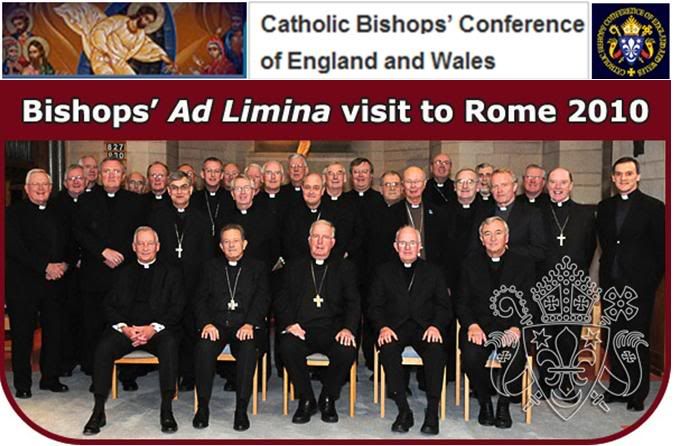
Damian Thompson and his readers are wondering why the Archbishop of Westminster, Mons. Vincent Nichols, and his fellow bishops from the Catholic Bishops' Conference of England Wales were conspicuously absent from the Vespers at St. Paul outside the Walls last Monday. afternoon.
The bishops are in Rome on ad limina visit, as their website has duly memorialized in the above 'class picture'.
The Pope met with Mons. Nichols and his auxiliaries in the first group on Monday morning, and met the second group this morning.
[Modificato da TERESA BENEDETTA 06/02/2010 15:46] |
| |
 28/01/2010 20:57 28/01/2010 20:57 |
|
| | | OFFLINE | | Post: 19.367
Post: 2.009 | Registrato il: 28/08/2005
Registrato il: 20/01/2009 | Administratore | Utente Veteran | |
|
 Christians and the truth
Christians and the truth
that will (re)-unite them

January 29, 2010
Although it has been a few days since the end of the Week of Prayer for Christian Unity, one must point out the obvious: Benedict XVI's efforts for Christian unity are serious.
These are no courteous accessories meant to show that he is not in conflict with others. Nor is it a question of bon ton - correct behavior or right attitude - towards other Churches.
For Papa Ratzinger, the fact that the disciples of Jesus should commit themselves to proceeding on a common front is of crucial importance to the future of the world.
And so, in the General Audience last January 20, he made it clear that Christian reunification will not happen by itself and with merely human means. That it is not a question of making agreements, nor of behaving so that we are not stepping on each other, but "a process of purification in which the Lord makes us capable of being united".
The ecumenical objective does not have to do with applying political correctness to the relations among the churches and ecclesial communities who believe in Christ, but rather with placing Christian faith at the center.
Because what else can make Christians ready to overcome human logic and historical crystallizations if not trust in the Truth that comes from one Master?
Christian unity is not just an inter-Christian issue - it is a sign to the world. It is not by chance that from his very first homily as Pope, Benedict XVI has coupled the theme of Christian unity to the wider task of the Church to "win men over to the Gospel".
In the face of a world that is mired between relativism which renounces truth, and fanaticism which would impose it rather than seek it, Christians committed to their unity should manifest a different perspective: that truth, when you seek it with trust, has the power to change your life.
[Modificato da TERESA BENEDETTA 28/01/2010 20:58] |
| |
 29/01/2010 05:13 29/01/2010 05:13 |
|
| | | OFFLINE | | Post: 19.368
Post: 2.010 | Registrato il: 28/08/2005
Registrato il: 20/01/2009 | Administratore | Utente Veteran | |
|

 Turin Cathedral: Temporary closure
Turin Cathedral: Temporary closure
in preparation for the Exposition
of the Holy Shroud

The Cathedral of Turin (Duomo) was temporarily closed starting January 18 to prepare for the Exposition of the Holy Shroud which opens on April 9 and will last till May 23.
On Sunday, May 2, Pope Benedict XVI will be visiting Turin for the Exposition and the opportunity for a pastoral visit to Italy's northern industrial capital.
During the temporary closure and the Exposition, all parochial activities (Mass celebrations, confessions, etc.) will take place in the Spirito Santo church in Via Porta Palatina (via Cappella Verde side).
 The distinctive Chapel of the Holy Shroud is located right behind the Cathedral of Turin; center, John Paul II during his visit at the last previous Exposition of
The distinctive Chapel of the Holy Shroud is located right behind the Cathedral of Turin; center, John Paul II during his visit at the last previous Exposition of
the Shroud in 1998; and right, the winning design for the Pope's 'cathedra' during Benedict XVI's visit.
Meanwhile, the Archdiocese of Turin has chosen a design for the 'cathedra' to be used by Pope Benedict XVI when he visits Turin in May.
The competition launched for the design was won by a young architect from Udine, Ivan Vergendo, who designed an "essential and simple chair, inspired by the Transfiguration", with the image of the Holy Face found on the top part of the back rest.
Two identical chairs will be built by Friulian artisans, with wood and red velvet. After the Pope's visit, one chair will be kept by the firm that is making the chairs, the other goes to the Archdiocese of Turin.
Organizers said 817,850 persons have so far registered to see the Exposition, 93% of them Italian. The diocese expects more than a million to attend, along with 2,500 journalists from around the world, of which about a thousand have already applied for accreditation.
[Modificato da TERESA BENEDETTA 29/01/2010 05:14] |
| |
 29/01/2010 12:26 29/01/2010 12:26 |
|
| | | OFFLINE | | Post: 19.370
Post: 2.012 | Registrato il: 28/08/2005
Registrato il: 20/01/2009 | Administratore | Utente Veteran | |
|
 Friday, January 29
Friday, January 29
 From left: A children's book on Juniper; Murillo's 1618 painting; and the Brother Juniper cartoon.
Servant of God BROTHER JUNIPER [Fra Ginepro] (Italy, d 1258)
From left: A children's book on Juniper; Murillo's 1618 painting; and the Brother Juniper cartoon.
Servant of God BROTHER JUNIPER [Fra Ginepro] (Italy, d 1258)
One of the original Franciscans with St. Francis
Little is known about Ginepro's life before he joined Francis and his band of brothers in 1210, except
that he was a close friend of Francis from his younger days. Although he has come down in Franciscan
annals as the 'Franciscan clown' or 'jester of the Lord', he was entrusted by Francis to set up
Franciscan 'places' in Gualdo and Viterbo, and he was with St. Clare, conforting her on her deathbed.
He was renowned for his simplicity and kindness. A 1618 Murillo painting depicts him about to give up
his garments to a beggar. Five centuries later, the 18th-century missionary Junipero Serra would take
his religious name from Francis's friend. In 1958-1989, Brother Juniper inspired a popular syndicated
cartoon depicting him in modern situations.
Readings from today's Mass: www.usccb.org/nab/readings/012910.shtml
OR today.
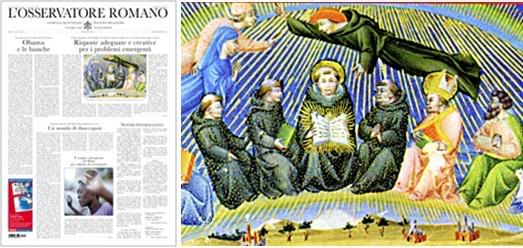 15th-cent illustration of Dante's Paradise Canto XIII that refers to St. Thomas Aquinas.
15th-cent illustration of Dante's Paradise Canto XIII that refers to St. Thomas Aquinas.

Benedict XVI reproposes the Thomist method to the Pontifical Academies as a way towards authentic Christian humanism:
'For adequate and creative responses to society's emerging problems'
Other Page 1 stories: A report on President Obama's first 'state of the union' message focuses on the President's offensive against big banking; the International Labor Organization says there are 212 million unemployed in 2010 equivalent to 6.6% of the labor force; and the logistical logjam continues in efforts to assist Haiti's two million earthquake victims. In the inside pages, an essay on art and spirituality in the Basilica of Santa Maria Maggiore by its Arch-Priest, Cardinal Bernard Law.
THE POPE'S DAY
The Holy Father met today with
- Bishops of England and Wales (Group 3) on ad limina visit
- Mons. Antoni Stankiewicz, Dean of the Tribunal of the Rota Romana
- College of Prelate Auditors of the Tribunal of the Rota Romana. Address in Italian.
[Modificato da TERESA BENEDETTA 29/01/2010 19:18] |
| |
 29/01/2010 19:00 29/01/2010 19:00 |
|
| | | OFFLINE | | Post: 19.372
Post: 2.014 | Registrato il: 28/08/2005
Registrato il: 20/01/2009 | Administratore | Utente Veteran | |
|
 The Holy Father makes a compelling theological argument that in the case of marriage annulments, charity must be administered with justice in order to be true.
Desire to return to sacraments
The Holy Father makes a compelling theological argument that in the case of marriage annulments, charity must be administered with justice in order to be true.
Desire to return to sacraments
not sufficient reason
for annulling marriage, Pope says
By Cindy Wooden

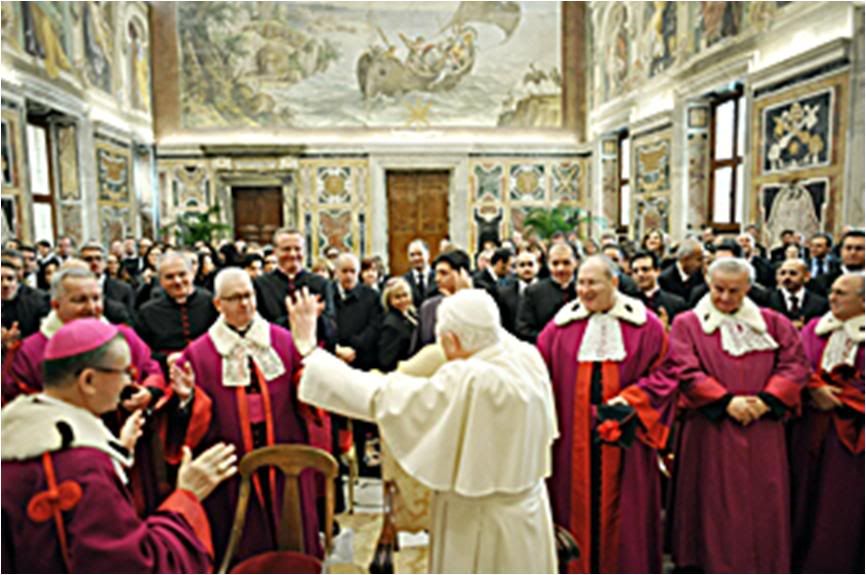
VATICAN CITY, Jan. 29 (CNS) -- True pastoral charity and concern can never lead the church to grant an annulment to a Catholic whose marriage is valid according to church law, Pope Benedict XVI said.
"One must shun pseudo-pastoral claims" that look only at the desire of divorced Catholics to return to the sacraments, the Pope said Jan. 29 in his annual speech to officials of the Roman Rota, a tribunal that mainly deals with appeals filed in marriage annulment cases.
The Pope said helping Catholics be able to go to confession and receive the Eucharist is important, but it cannot be done without taking into account the truth about their church marriage.
The Church cannot act charitably toward its faithful without upholding justice and truth, he said.
Charity without justice is "only a forgery because charity requires that objectivity that is typical of justice and which must not be confused with inhumane coldness," the pope said.
For the Catholic Church, he said, a marriage celebrated with the full consent of the couple and following the correct form is always presumed to be valid, and a valid marriage is indissoluble.
Pastors and those who work in church tribunals must beware of "the widespread and deeply rooted tendency" to see justice and charity as totally competing values, the Pope said.
Within the Church, he said, the idea leads some to think that "pastoral charity could justify any step" taken to grant an annulment for a couple who wants to return to the sacraments.
Defending the permanent bond of a valid marriage is a matter of both justice and love, he said, because it is designed to protect the human and spiritual good of the couple and "the public good of the church," which teaches that marriage is forever and does not use annulments as a sort of church-sanctioned divorce.
"It would be a fictitious good, and a serious lack of justice, to nevertheless smooth the way toward their reception of the sacraments," the Pope said
Pope Benedict told members of the Roman Rota that those who work on church marriage tribunals must cultivate the virtues of prudence and justice, but especially the virtue of fortitude, especially "when the unjust way appears easier to follow because it means condescending to the desires and hopes of the couple."
"Both justice and charity require love for the truth and essentially lead to a search for the truth," he said.
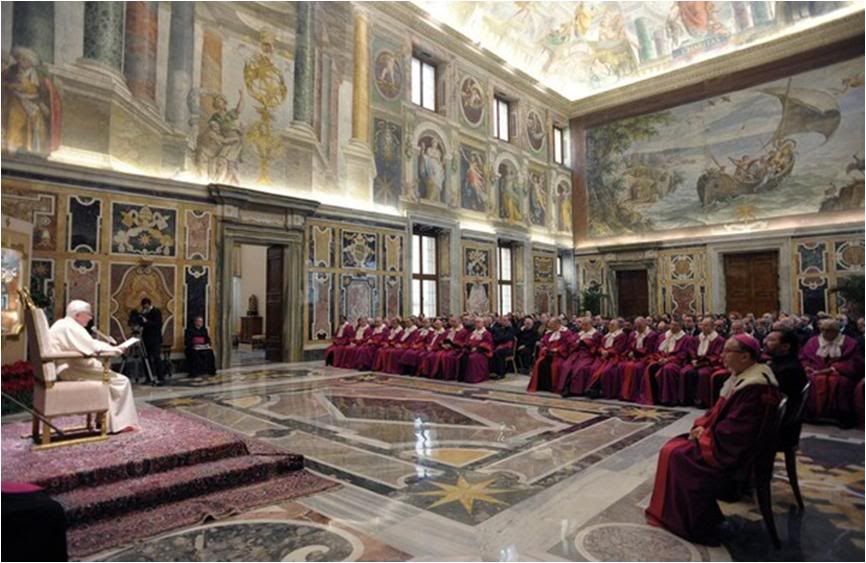 Here is a translation of the Holy Father's address to the Rota:
Here is a translation of the Holy Father's address to the Rota:
Dear Members of the Tribunal of the Roman Rota:
I am happy to meet you once again for the inauguration of the Judicial Year. I cordially greet the College of Prelate Auditors, starting with the Dean, Mons. Antoni Stankiewicz, whom I thank for the words he spoke in behalf of all present.
I extend my greeting to the Promoters of Justice, the Defenders of the Bond, the other officials and advocates, and all the collaborators of this Apostolic Tribunal, as well as the members of the Rota Studio.
I gladly take the occasion to renew the expression of my profound esteem and sincere gratitude for your ecclesiastical ministry while reiterating the need for your judicial activity.
The precious work that the Prelate Auditors are called on to carry out with diligence, in the name and under the mandate of this Apostolic See, is sustained by the authoritative and consolidated traditions of this Tribunal, to which each of us should feel personally committed.
Today I wish to dwell on the essential nucleus of your ministry, seeking to examine its relationship with justice, charity and truth. I will refer especially to some considerations expressed in Caritas in veritate which, although presented in the context of the social doctrine of the Church, can also illuminate other ecclesial areas.
One must take note of the widespread and rooted tendency, even though it may not always be manifest, that leads to opposing justice to charity, almost as if one excludes the other.
Along this line, referring specifically to the life of the Church, some maintain that pastoral charity could justify every step made towards declaring the nullity of the matrimonial bond in order to meet the expectations of persons who find themselves in irregular matrimonial situations.
Truth itself, even when invoked in words, would tend to be seen from an instrumental viewpoint which would adapt it from time to time to different exigencies that present themselves.
Beginning with the expression 'administration of justice', I wish to point out first of all that your ministry is essentially a work of justice: a virtue - "that consists in the constant and firm will to give to God and one's neighbor that which is due them" (Catechism of the Catholic Church, 1807) - whose human and Christian value it is more than ever important to rediscover, even within the Church.
Canon Law, at times, is under-estimated, as if it was a mere technical instrument in the service of some subjective interest even if not founded on the truth. Instead, such law must always be considered in its essential relationship with justice, knowing that in the Church, the objective of judicial activity is the salvation of souls and it "constitutes a peculiar participation in the mission of Christ the Shepherd.... in realizing the order desired by Christ himself" (John Paul II, Allocution to the Rota Romana, 18 Jan 1990, AAS 82 [1990], p. 874, n.4).
In this perspective, one must also bear in mind, in any situation, that the process and the sentence are linked fundamentally to justice and must be placed at its service.
The process and the sentence have a great relevance both for the sides to a dispute, as well as for the entire ecclesial side, and this acquires a most singular value when it has to do with pronouncing on the nullity of a matrimony which directly concerns the human and supranatural good of the spouses, as well as the public good of the Church.
Beyond this dimension of justice that we may define as 'objective', there is another one that is inseparable from it, which concerns the 'operators of the law', namely, those who make it possible.
I wish to underscore that they must be characterized by the high exercise of human and Christian virtues, particularly prudence and justice, but also fortitude.
This last virtue becomes more relevant the more that injustice appears to be the easiest way to follow, insofar as it implies accommodating the desires and expectations of the parties or even to the conditioning of the social climate.
In this context, the justice who desires to be just and wishes to live up to the classic paradigm of the 'living judge' (cfr Aristotle, Nicomachean Ethics, V, 1132a), has the grave responsibility before God and men of his function, which includes due timeliness in every phase of the process: «quam primum, salva iustitia» [Save justice as soon as possible](Pontifical Council for Legislative Texts, Instr. Dignitas connubii, art. 72).
All those who work in the field of law, each according to his own function, must be guided by justice. I think particularly of the advocates, who must not only pay every attention to respecting the truth of the evidence, but also, as trustworthy lawyers, carefully avoid patronage of causes which, according to their conscience, cannot be objectively supported.
The action, therefore, of those who administer justice cannot be done without charity. Love for God and one's neighbor should inform every activity, even those that are apparently the most technical and bureaucratic.
The viewpoint and the measure of charity will help not to forget that the judge is dealing with persons who have problems and sufferings. The principle that "Charity goes beyond justice' (Enc. Caritas in veritate, No. 6) is valid even for workers in justice.
Consequently, the approach to persons, even if there is a specific modality linked to the process of justice, must come down to the concrete case, in order, through sensitivity and concern, to facilitate contact with the competent tribunal by the parties to the case.
At the same time, it is important to strive concretely, every time one glimpses hope for a good outcome, to induce the spouses to eventually convalidate their matrimony and re-establish conjugal coexistence (cfr CIC, can. 1676). Moreover, one must not neglect to try and establish between the spouses a climate of human and Christian willingness that is based on the search for the truth (cfr Instr. Dignitas connubii, art. 65 §§ 2-3).
It must be reiterated that every work of authentic charity includes an indispensable reference to justice, much more so in our case. "Love - caritas - is an extraordinary force which leads people to opt for courageous and generous engagement in the field of justice and peace" (Enc. Caritas in veritate, No.1).
"If we love others with charity, then first of all, we are just towards them. Not only is justice not extraneous to charity, not only is it not an alternative or parallel path to charity: justice is inseparable from charity, and intrinsic to it" (Ibid., No.6).
Charity without justice is not charity, but a counterfeit, because charity itself requires that objectivity which is typical of justice and which must not be confused with human coldness.
In this regard, as my predecessor, Venerable John Paul II, said in his allocution on the relationship between pastoral care and the law: "The judge... must always guard against the risk of misplaced compassion which would come down to sentimentalism that is only apparently pastoral" (Jan. 18, 1990, in AAS, 82 [1990], p. 875, n. 5).
One must avoid pseudo-pastoral claims that would situate questions merely on a horizontal plane, in which what matters is to satisfy subjective requests in order to reach a declaration of nullity at any cost, in order that the parties may be able to overcome, among other things, obstacles to receiving the Sacraments of Penance and the Eucharist.
The highest good of readmission to Eucharistic Communion after sacramental reconciliation demands, instead, that the authentic good of the spouses, inseparable from the truth of their canonical situation, must be considered.
It would be a fiction and a grave lack of justice and love to pave the way for them to receive the sacraments, while making them live in objective contradiction to the truth of their own personal condition.
Regarding truth, in my addresses to this Apostolic Tribunal in 2006 and 2007, I reiterated the possibility of reaching the truth on the essence of matrimony and the reality of every personal situation that comes to the jurisdiction of this tribunal (Jan. 28, 2006, in AAS 98 [2006], pp. 135-138; and Jan. 26, 2007, in AAS 99 [2007], pp. 86-91), and also on the truth of matrimonial processes (cfr Instr. Dignitas connubii, artt. 65 §§ 1-2, 95 § 1, 167, 177, 178).
Today I wish to underscore how justice as well as charity both postulate love for truth and essentially involve the search for what is true. In particular, charity makes the reference to truth even more demanding.
"To defend the truth, to articulate it with humility and conviction, and to bear witness to it in life are therefore exacting and indispensable forms of charity. Charity, in fact, 'rejoices in the truth' (1 Cor 13:6)" (Enc. Caritas in veritate, No. 1).
"Only in truth does charity shine forth, only in truth can charity be authentically lived... Without truth, charity degenerates into sentimentality. Love becomes an empty shell, to be filled in an arbitrary way. In a culture without truth, this is the fatal risk facing love. It falls prey to contingent subjective emotions and opinions, the word 'love' is abused and distorted, to the point where it comes to mean the opposite" (Ibid., No.3).
One must keep in mind that a similar emptying can take place not only by the mere practice of judging but also in theoretical formulations which eventually have very great influence on concrete judgments. The problem arises when the essence of matrimony itself, rooted in the nature of man and woman, is more or less obscured, in expressing objective judgments on a specific case.
In this sense, existential, personal and relational considerations of the conjugal union can never be made at the expense of indissolubility, an essential property which, in Christian matrimony, achieves, with unity, a particular stability because of the sacrament (cfr CIC, can. 1056).
Moreover, it must not be forgotten that matrimony is favored by the law. Therefore, in case of doubt, it must be considered valid until the contrary has been proven (cfr CIC, can. 1060). Otherwise, there is a grave risk that one does hot have an objective reference point for pronouncements on the nullity of the marriage, by transforming every conjugal difficulty into a symptom of the failed realization of a union whose essential nucleus of justice - the indissoluble bond - is in fact denied.
Distinguished Prelate Auditors, officials and advocates, I entrust these reflections to you, knowing well the spirit of faithfulness that inspires you and the commitment that you deepen in fully carrying out the norms of the Church, in the search for the true good of the People of God.
As comfort for your valuable work, on each of you and your daily work I invoke the maternal protection of the Most Blessed Mary, Mirror of Justice, and I impart the Apostolic Blessing with affection.
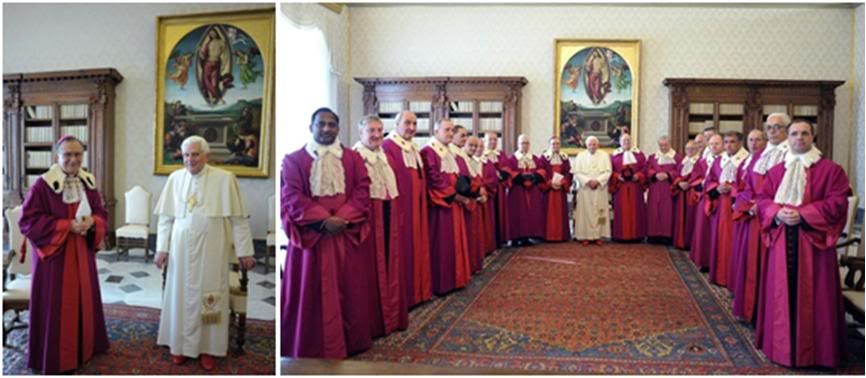 Before addressing the Rota, the Holy Father had a private audience first with Mons. Anthony Stankiewicz, the presiding judge, and with the other judges.
Pope urges Church tribunal
Before addressing the Rota, the Holy Father had a private audience first with Mons. Anthony Stankiewicz, the presiding judge, and with the other judges.
Pope urges Church tribunal
to focus on saving marriages

VATICAN CITY, Jan. 29 (AP) - Pope Benedict XVI has urged church tribunals to work harder to encourage couples to stay married and not resort to granting annulments "at all costs."
An annulment is the process by which the church effectively declares that a marriage never took place. Many Catholics seek them so they can remarry in the Church and receive Communion.
Benedict told members of the Roman Rota, the Vatican tribunal that decides marriage annulments, that they shouldn't confuse "pastoral charity" in granting annulments with their need to uphold church law.
The Vatican's concern largely is directed at the United States, which in 2006 had more annulment cases launched than the rest of the world combined.
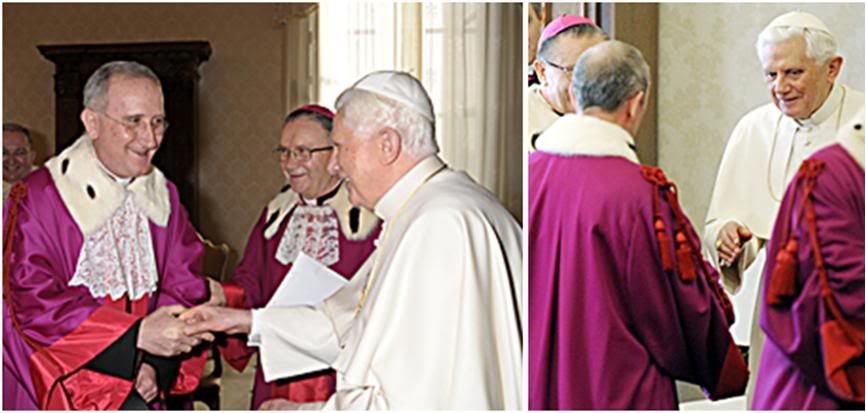
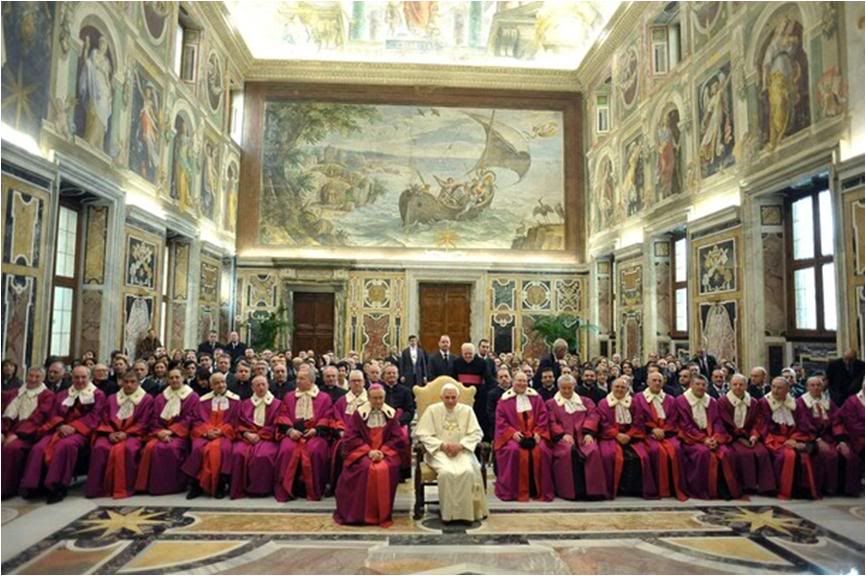
[Modificato da TERESA BENEDETTA 30/01/2010 11:23] |
| |
 30/01/2010 12:47 30/01/2010 12:47 |
|
| | | OFFLINE | | Post: 19.375
Post: 2.017 | Registrato il: 28/08/2005
Registrato il: 20/01/2009 | Administratore | Utente Veteran | |
|
[Modificato da TERESA BENEDETTA 30/01/2010 12:53] |
| |
|
|
|
|